-
CATEGORY ::
- All Seeds /
- All Ground Cover Seeds /
- All Verbena Seeds


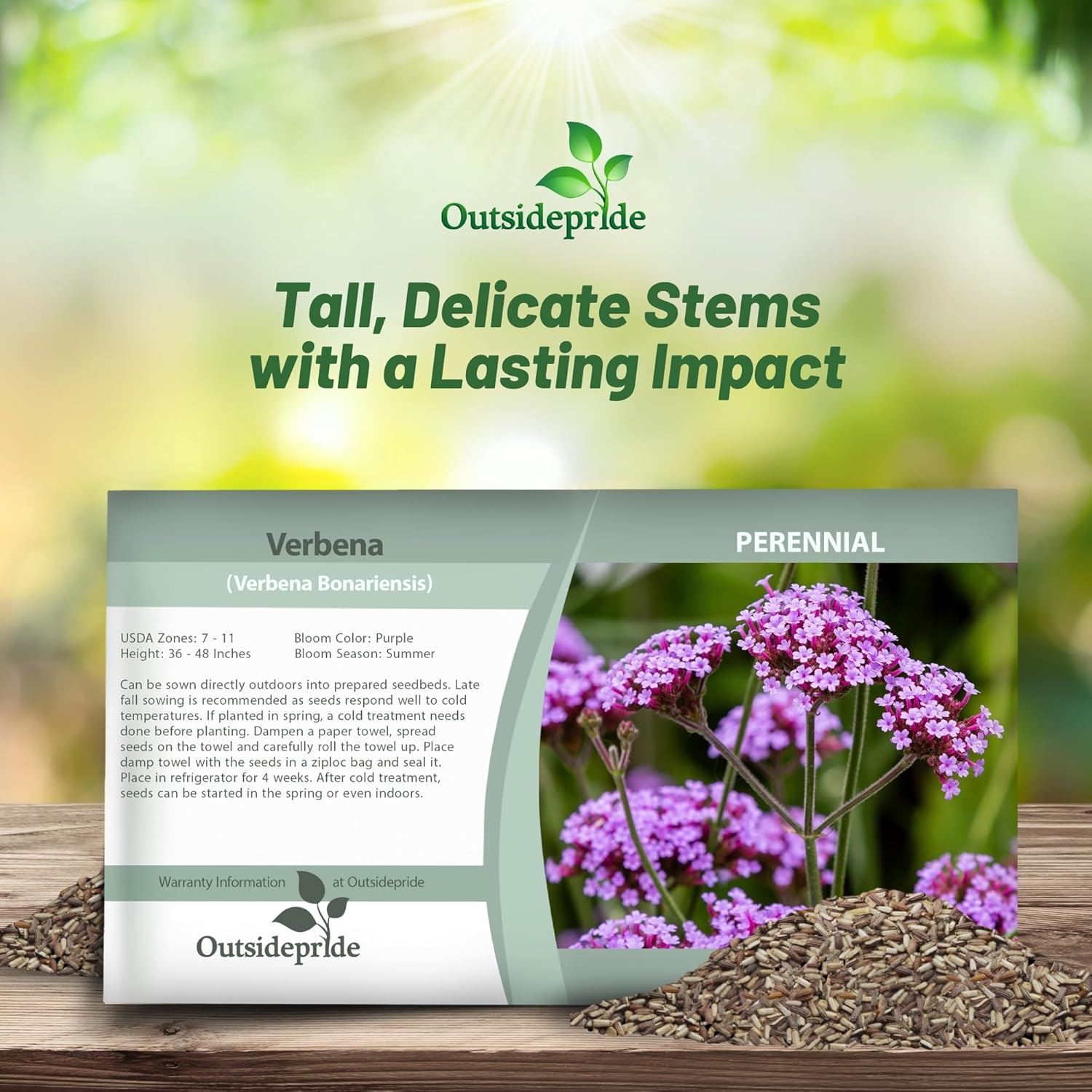
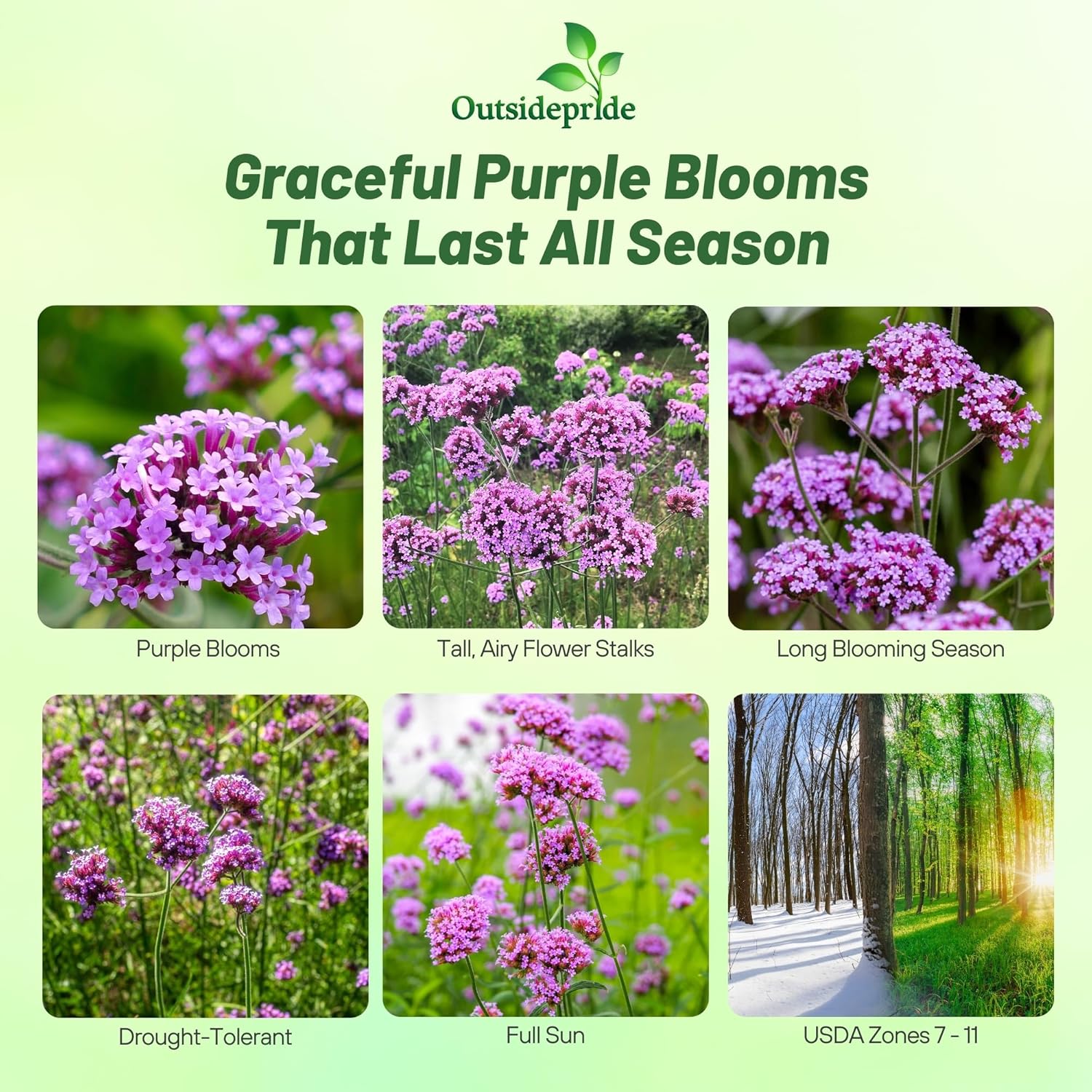
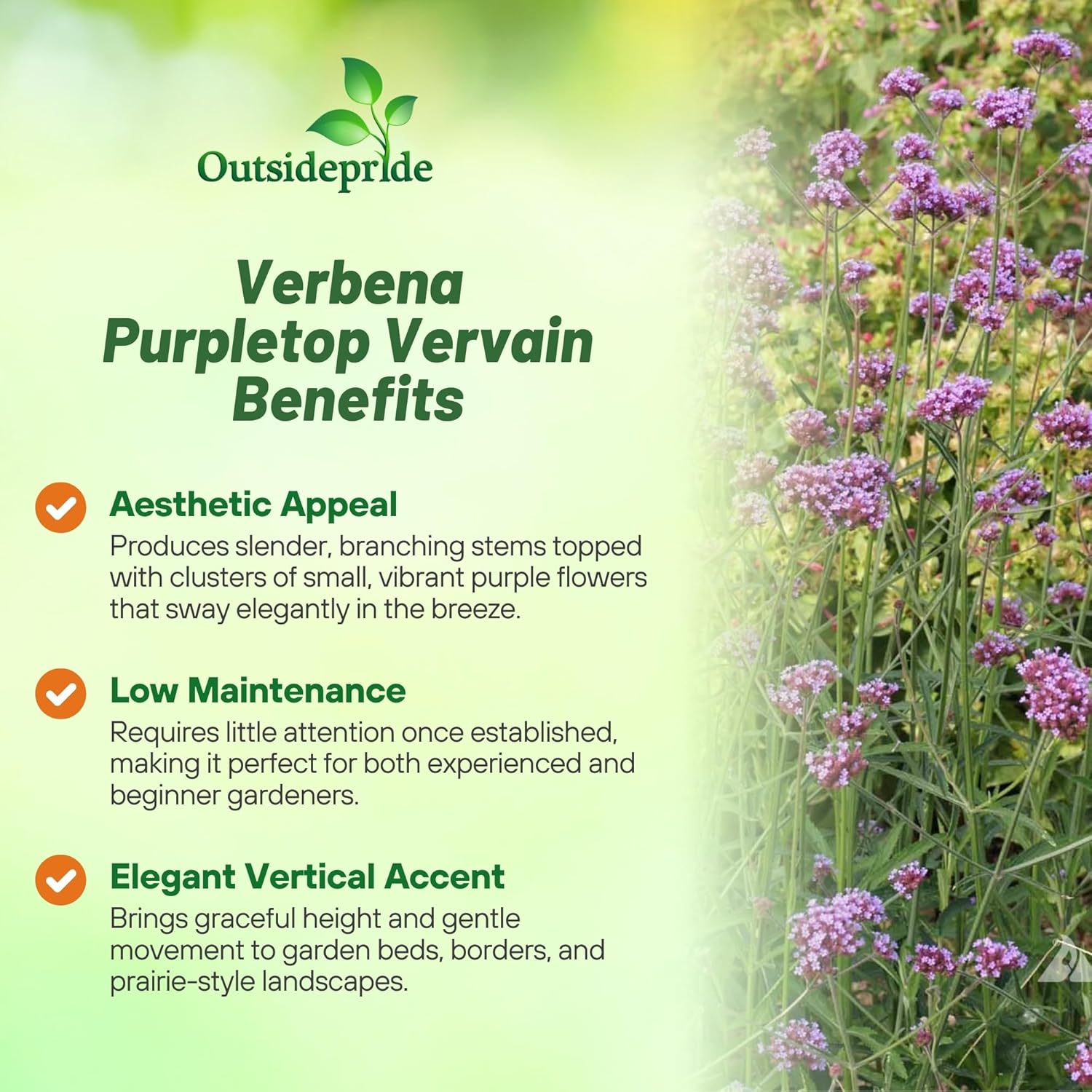
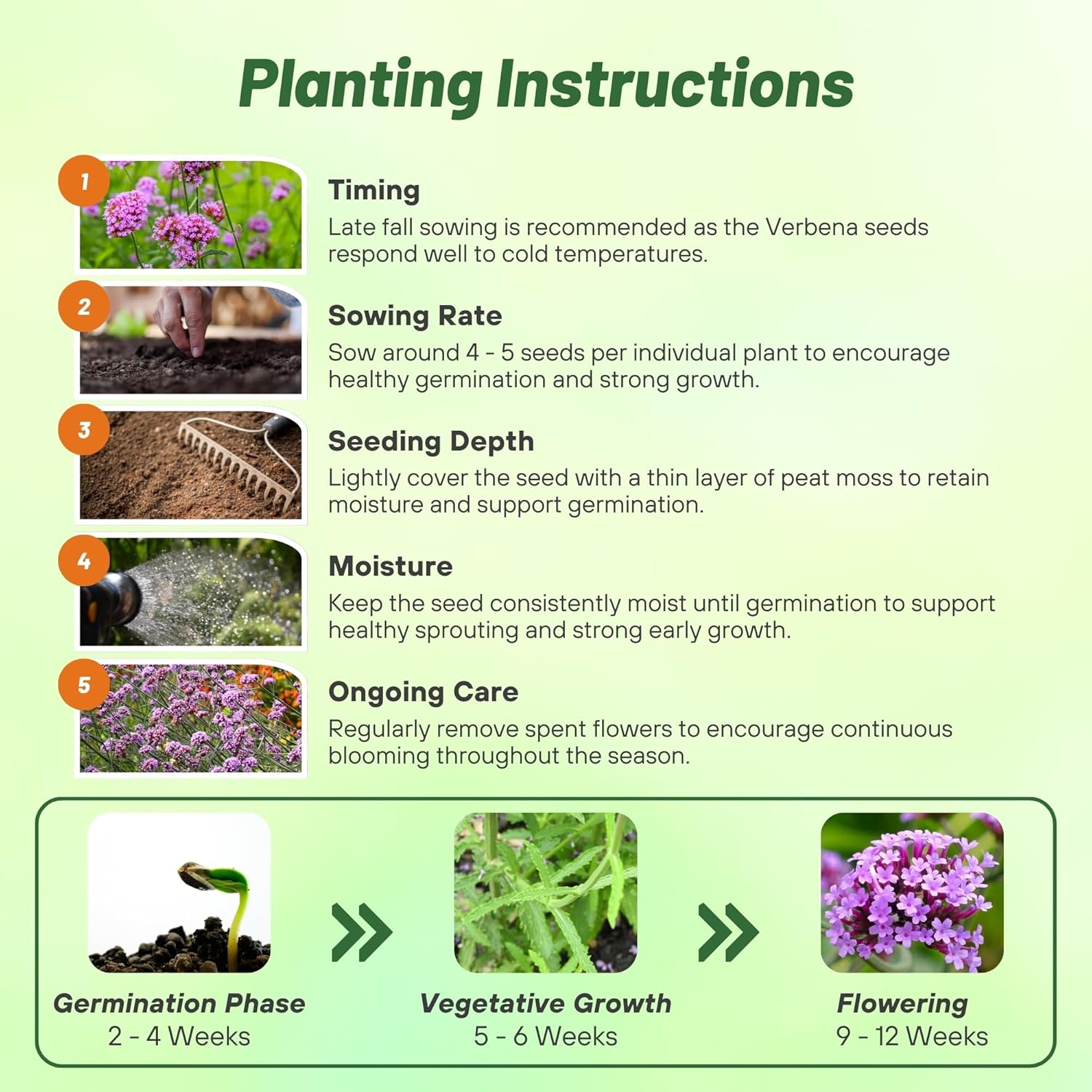
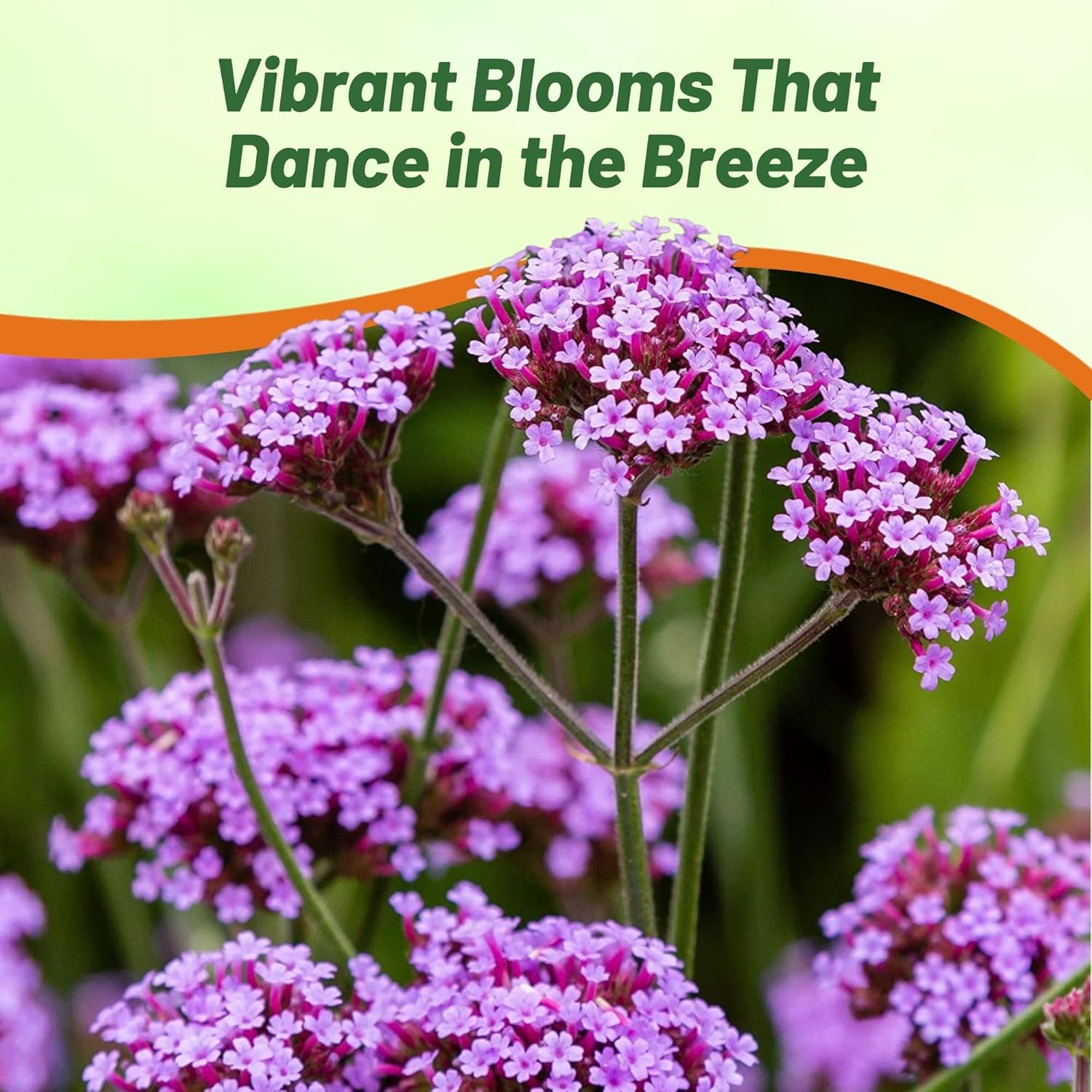
Verbena Seeds - Purpletop Vervain
SEASON
Perennial
USDA ZONES
7 - 11
HEIGHT
36 - 48 inches
BLOOM SEASON
Summer
BLOOM COLOR
Purple
ENVIRONMENT
Full sun
SOIL TYPE
Well-drained, pH 5.8 - 7.2
DEER RESISTANT
Yes
FOLIAGE COLOR
Gray-green
SEASON
Annual
USDA ZONES
3 - 10
HEIGHT
10 - 16 inches
WIDTH
12 inches
BLOOM SEASON
Late Spring to frost
BLOOM COLOR
Mix
ENVIRONMENT
Full to partial sun
SOIL TYPE
Well-drained, pH 5.8 - 7.2
DEER RESISTANT
Yes
AAS WINNER
2024
SEASON
Annual
USDA ZONES
3 - 10
HEIGHT
8 inches
BLOOM SEASON
Spring through fall
BLOOM COLOR
Apricot
ENVIRONMENT
Full sun
SOIL TYPE
Well-drained, pH 5.8 - 7.2
DEER RESISTANT
Yes
SEASON
Annual
USDA ZONES
3 - 10
HEIGHT
8 inches
BLOOM SEASON
Spring through fall
BLOOM COLOR
Rose
ENVIRONMENT
Full sun
SOIL TYPE
Well-drained, pH 5.8 - 7.2
DEER RESISTANT
Yes
SEASON
Annual
USDA ZONES
3 - 10
HEIGHT
8 inches
BLOOM SEASON
Spring through fall
BLOOM COLOR
Scarlet
ENVIRONMENT
Full sun
SOIL TYPE
Well-drained, pH 5.8 - 7.2
DEER RESISTANT
Yes
SEASON
Annual
USDA ZONES
3 - 10
HEIGHT
8 inches
BLOOM SEASON
Spring through fall
BLOOM COLOR
White
ENVIRONMENT
Full sun
SOIL TYPE
Well-drained, pH 5.8 - 7.2
DEER RESISTANT
Yes
SEASON
Perennial
USDA ZONES
3 - 9
HEIGHT
24 - 48 inches
BLOOM SEASON
Mid-summer and fall
BLOOM COLOR
Blue
GROWTH RATE
Medium
ENVIRONMENT
Full sun
SOIL TYPE
Moist, well-drained, pH 5.8 - 7.2
DEER RESISTANT
Yes
FOLIAGE COLOR
Dark green
SEASON
Perennial
USDA ZONES
3 - 9
HEIGHT
24 - 36 inches
BLOOM SEASON
Summer
BLOOM COLOR
Purple
GROWTH RATE
Medium
ENVIRONMENT
Full sun
SOIL TYPE
Clay, sand, or gravel, pH 5.8 - 7.2
DEER RESISTANT
Yes
FOLIAGE COLOR
Whitish-green
About...
Verbena (Verbena Bonariensis) - Commonly called Purpletop Vervain, this is one of the best flowering perennials for attracting butterflies, and in particular the Tiger Swallowtail. Easily grown from Verbena seeds, this is a long-blooming, drought tolerant plant that is extremely easy to grow.MORE VERBENA OPTIONS
Planting Directions
TEMPERATURE
70 - 75F
AVERAGE GERM TIME
14 - 28 days
LIGHT REQUIRED
No
DEPTH
Cover seed lightly with peat moss
SOWING RATE
4 - 5 seeds per plant
MOISTURE
Keep seeds moist until germination
PLANT SPACING
24 inches
CARE & MAINTENANCE
Verbena...less

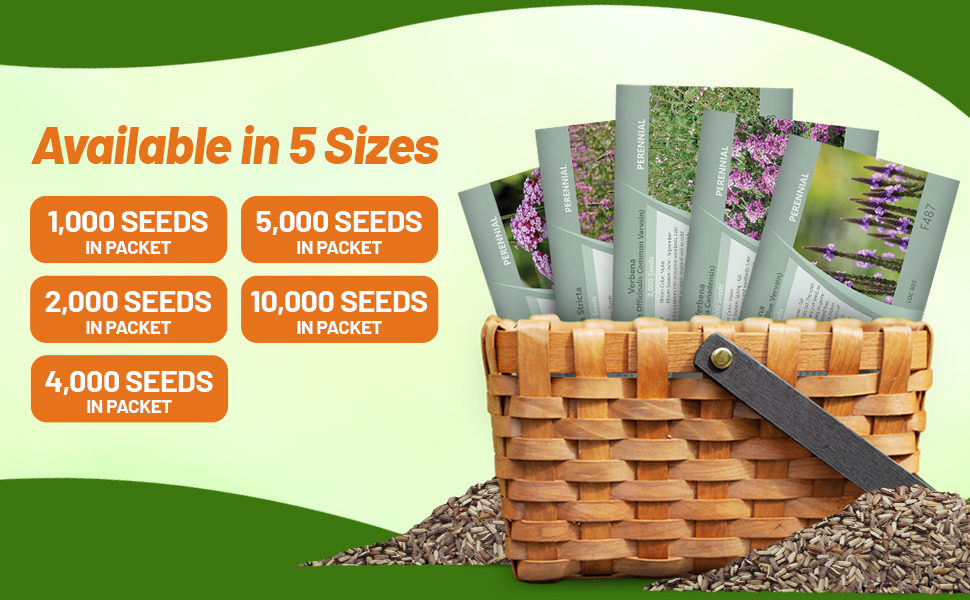
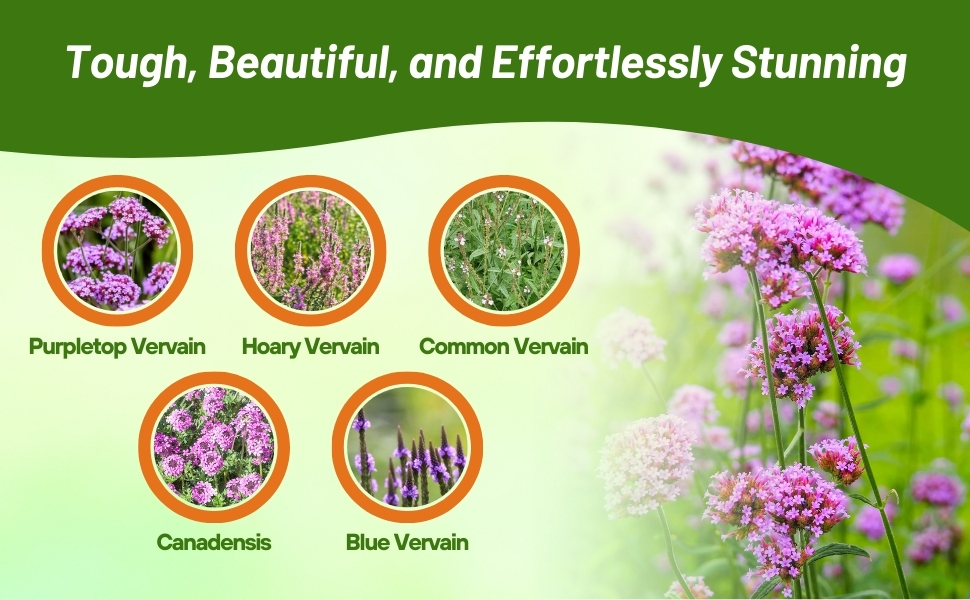
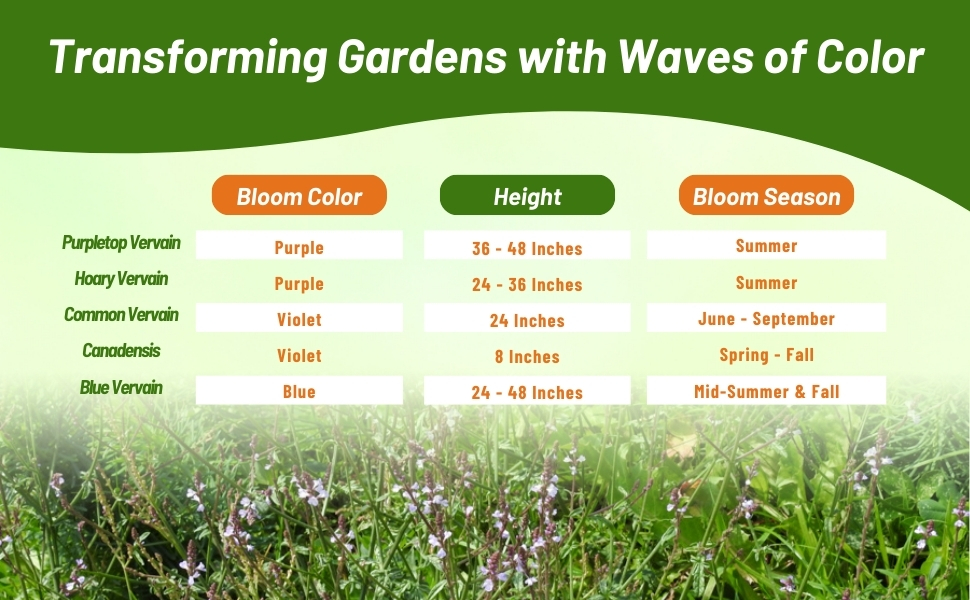
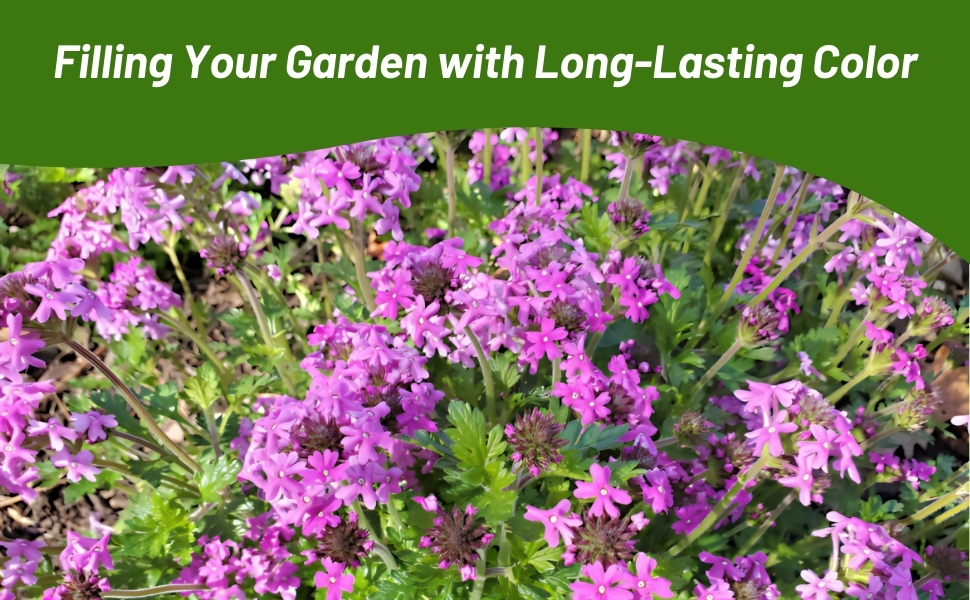
Verbena (Verbena Bonariensis) - Commonly called Purpletop Vervain, this is one of the best flowering perennials for attracting butterflies, and in particular the Tiger Swallowtail. Easily grown from Verbena seeds, this is a long-blooming, drought tolerant plant that is extremely easy to grow. The rosy-violet flowers are tiny and extremely profuse. The flower clusters are held on long strong stems. This variety has been called Verbena on a stick! It is also referred to as Brazilian Verbena and Upright Verbena.
Upright Verbena Bonariensis grows best in full sun, and it is fairly drought tolerant. It can grow well in a variety of soil types from loam to clay. Brazilian Verbena plants can re-seed by dropping its flower seeds in the late bloom period. Deadhead the spent flowers if re-seeding is not desired. Purpletop Verbena has been found in such habitats as fields, roadsides, weedy meadows, and other disturbed areas. It also makes a stunning addition to the flower garden or border. It is fairly resistant to both deer and rabbits.
Brazilian Verbena seeds can be sown directly outdoors into prepared seedbeds. Late fall sowing is recommended as the Verbena seeds respond well to cold temperatures. If Purpletop Vervain seeds are planted in the spring, a cold treatment needs to be done before planting. Dampen a paper towel, spread the Verbena seeds on the towel and carefully roll the towel up. Place the damp towel with the seeds in a ziploc bag and seal it. Place the bag with the flower seeds into the refrigerator for 4 weeks. After the cold treatment, the seeds can be started in the spring or even indoors.
Approximately 113,500 seeds per ounce.
Common Questions
How long do verbena plants live?
When cultivated as perennials, verbenas typically have a short lifespan, often lasting only two to three years. However, if you are growing a species type instead of a hybrid, these plants can self-seed freely, potentially establishing themselves in such a way that they seem to thrive indefinitely.
How is this plant used in landscaping?
Verbenas thrive in sunny conditions and make excellent companion plants for other sun-loving varieties such as coneflowers, coreopsis, lamb's ear, phlox, and petunias. Hybrid annual verbenas are known for their consistent blooming and are often used in pots or as bedding plants in gardens. They can be planted in groups or positioned as front-edging plants, where their sprawling nature is particularly advantageous. Many hybrids exhibit a trailing growth habit, making them ideal for hanging baskets, rock gardens, or gracefully cascading over short retaining walls. Some varieties spread out, effectively covering ground in sunny locations.
My plants are getting leggy, what do I do?
When verbenas become leggy and sparse, it may indicate that the plant is reaching out for more light. Ensure that the plant gets a minimum of six hours of sunlight daily. If sunlight isn't the problem, consider pruning it back significantly and providing nourishment. This combination of pruning and feeding should encourage robust new growth and an abundance of blooms.
How can I encourage more blooms?
Deadhead your spent flowers to encourage a longer bloom season.
Can I grow in containers?
Verbena is often seen in hanging baskets combined with various flowers, serving as excellent "spillers" that cascade over the edges of the container. For container planting, any general-purpose potting mix can be used in well-draining containers of any material. Additionally, if verbena is growing in the ground, you can pot it up for indoor overwintering. Typically grown as annuals, potted verbenas generally do not need repotting and should be discarded at the end of the growing season. Perennial verbenas have a relatively short lifespan of two to three growing seasons and are not ideal as permanent houseplants. However, potted verbenas can be classified as warm-climate perennials, allowing you to bring them indoors to continue growing during winter. If you choose to move them inside, trim them back by one-third before the transition and place them in a spot that receives ample sunlight.
Planting Directions
TEMPERATURE
65 - 70F
AVERAGE GERM TIME
7 - 12 days
LIGHT REQUIRED
No
DEPTH
1/4 inch
SOWING RATE
2 - 3 seeds per plant
MOISTURE
Keep seeds moist until germination
PLANT SPACING
12 inches

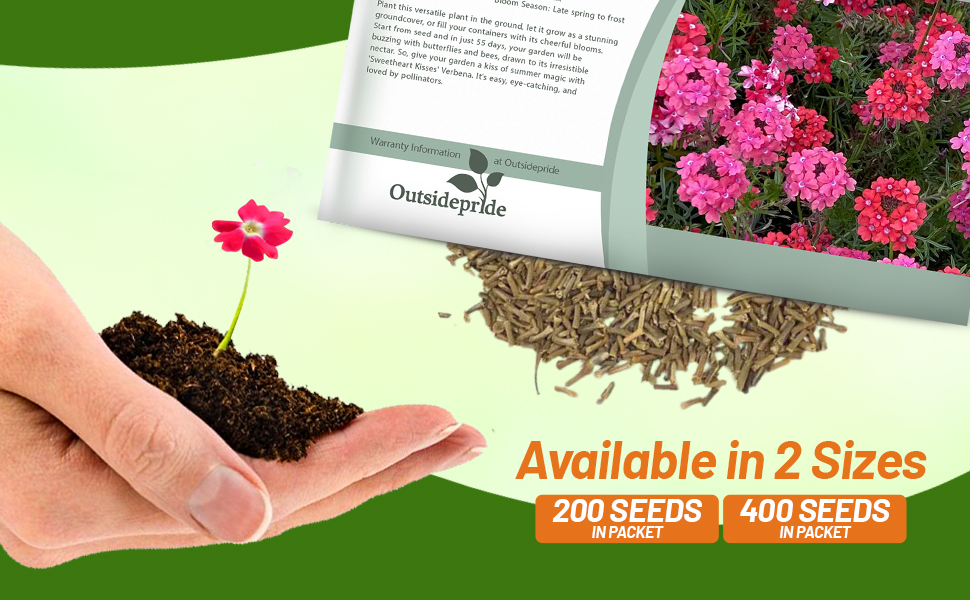
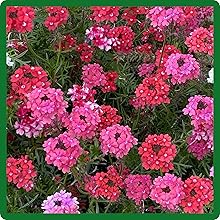
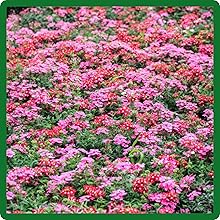
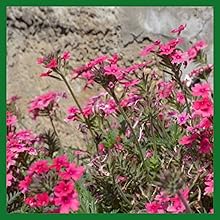
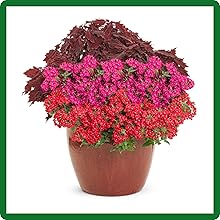

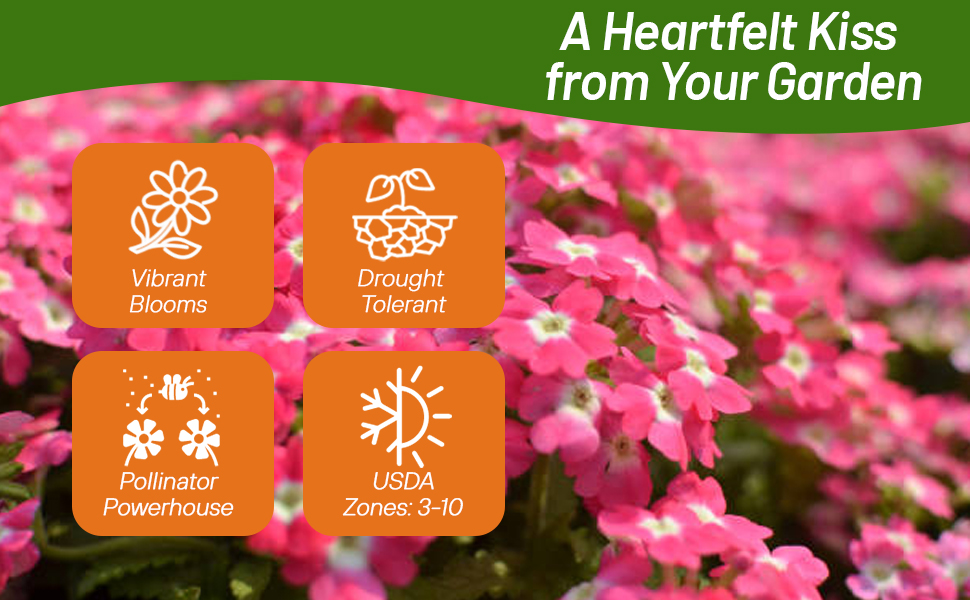
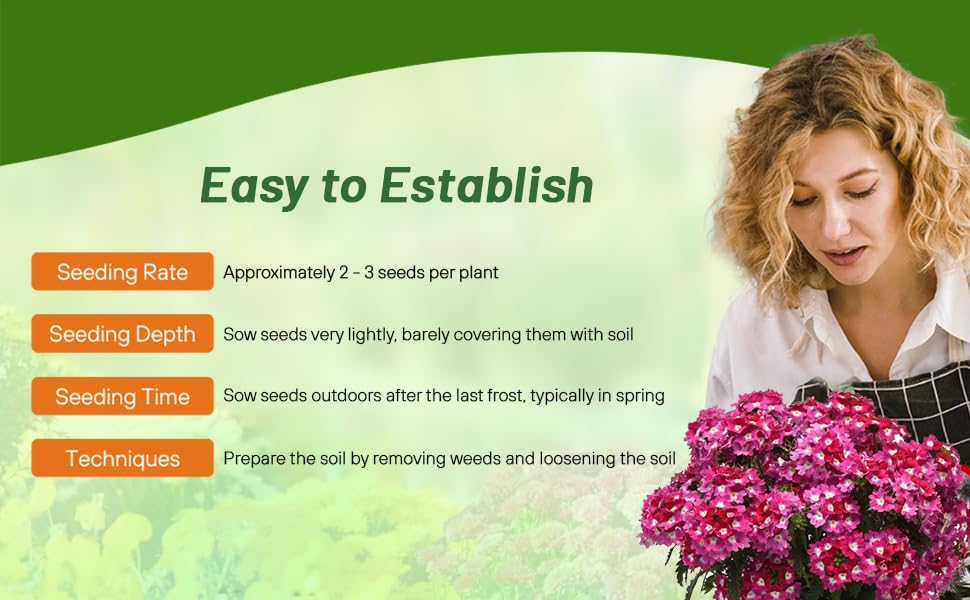
Moss Verbena Sweetheart Kisses (Verbena Tenuisecta) - Kiss your summer worries goodbye with Sweetheart Kisses Verbena! This low-growing wonder, praised by AAS judges for its vibrant red, rose, pink, and a hint of white blooms, adds instant charm to any garden. Delicate, airy foliage (tenuisecta means “thinly cut”) forms a soft cushion, setting the stage for an explosion of color that lasts all season long. Sweetheart Kisses thrives in sun-drenched days and dry spells. Plant this versatile plant in the ground, let it grow as a stunning groundcover, or fill your containers with its cheerful blooms. And the best part? Sweetheart Kisses is a breeze to grow!
Start from seed and in just 55 days, your garden will be buzzing with butterflies and bees, all drawn to its irresistible nectar. So, give your garden a kiss of summer magic with ‘Sweetheart Kisses’ Verbena. It’s easy, eye-catching, and loved by pollinators.
2024 AAS Flower Winner. Kiss your summer worries goodbye with Sweetheart Kisses Verbena! This low-growing wonder, praised by AAS judges for its vibrant red, rose, pink, and a hint of white blooms, adds instant charm to any garden. Delicate, airy foliage (tenuisecta means "thinly cut") forms a soft cushion, setting the stage for an explosion of color that lasts all season long. Sweetheart Kisses thrives in sun-drenched days and dry spells. Plant this versatile plant in the ground, let it grow as a stunning groundcover, or fill your containers with its cheerful blooms. And the best part? Sweetheart Kisses is a breeze to grow! Start from seed and in just 55 days, your garden will be buzzing with butterflies and bees, all drawn to its irresistible nectar. So, give your garden a kiss of summer magic with 'Sweetheart Kisses' Verbena. It's easy, eye-catching, and loved by pollinators, What more could you ask for?
Common Questions
How long do verbena plants live?
When cultivated as perennials, verbenas typically have a short lifespan, often lasting only two to three years. However, if you are growing a species type instead of a hybrid, these plants can self-seed freely, potentially establishing themselves in such a way that they seem to thrive indefinitely.
How is this plant used in landscaping?
Verbenas thrive in sunny conditions and make excellent companion plants for other sun-loving varieties such as coneflowers, coreopsis, lamb's ear, phlox, and petunias. Hybrid annual verbenas are known for their consistent blooming and are often used in pots or as bedding plants in gardens. They can be planted in groups or positioned as front-edging plants, where their sprawling nature is particularly advantageous. Many hybrids exhibit a trailing growth habit, making them ideal for hanging baskets, rock gardens, or gracefully cascading over short retaining walls. Some varieties spread out, effectively covering ground in sunny locations.
My plants are getting leggy, what do I do?
When verbenas become leggy and sparse, it may indicate that the plant is reaching out for more light. Ensure that the plant gets a minimum of six hours of sunlight daily. If sunlight isn't the problem, consider pruning it back significantly and providing nourishment. This combination of pruning and feeding should encourage robust new growth and an abundance of blooms.
How can I encourage more blooms?
Deadhead your spent flowers to encourage a longer bloom season.
Can I grow in containers?
Verbena is often seen in hanging baskets combined with various flowers, serving as excellent "spillers" that cascade over the edges of the container. For container planting, any general-purpose potting mix can be used in well-draining containers of any material. Additionally, if verbena is growing in the ground, you can pot it up for indoor overwintering. Typically grown as annuals, potted verbenas generally do not need repotting and should be discarded at the end of the growing season. Perennial verbenas have a relatively short lifespan of two to three growing seasons and are not ideal as permanent houseplants. However, potted verbenas can be classified as warm-climate perennials, allowing you to bring them indoors to continue growing during winter. If you choose to move them inside, trim them back by one-third before the transition and place them in a spot that receives ample sunlight.
Planting Directions
TEMPERATURE
75F
AVERAGE GERM TIME
7 - 28 days
LIGHT REQUIRED
No
DEPTH
Cover seed lightly with peat moss
SOWING RATE
2 - 3 seeds per plant
MOISTURE
Keep seeds slightly moist to dry
PLANT SPACING
12 - 18 inches
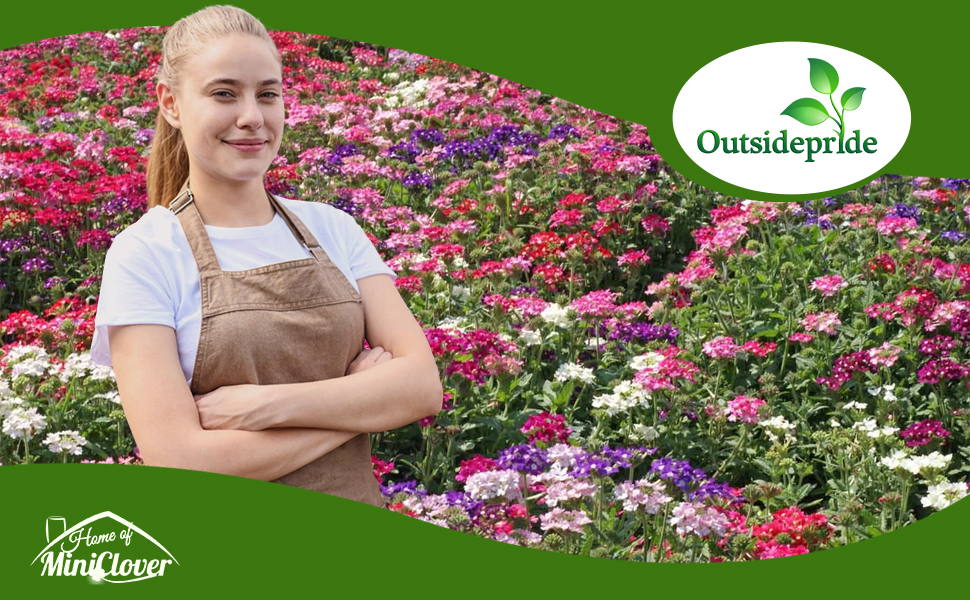
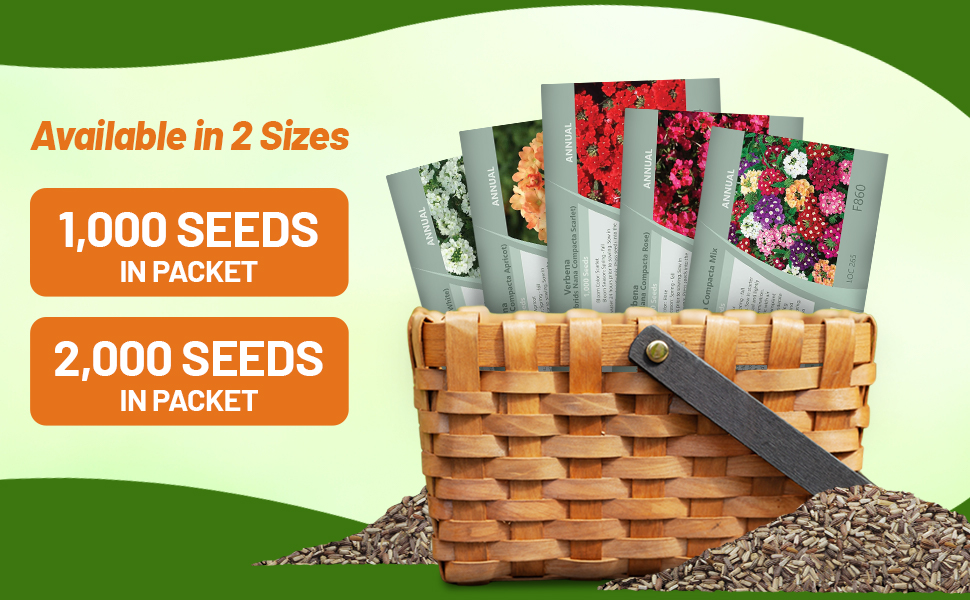
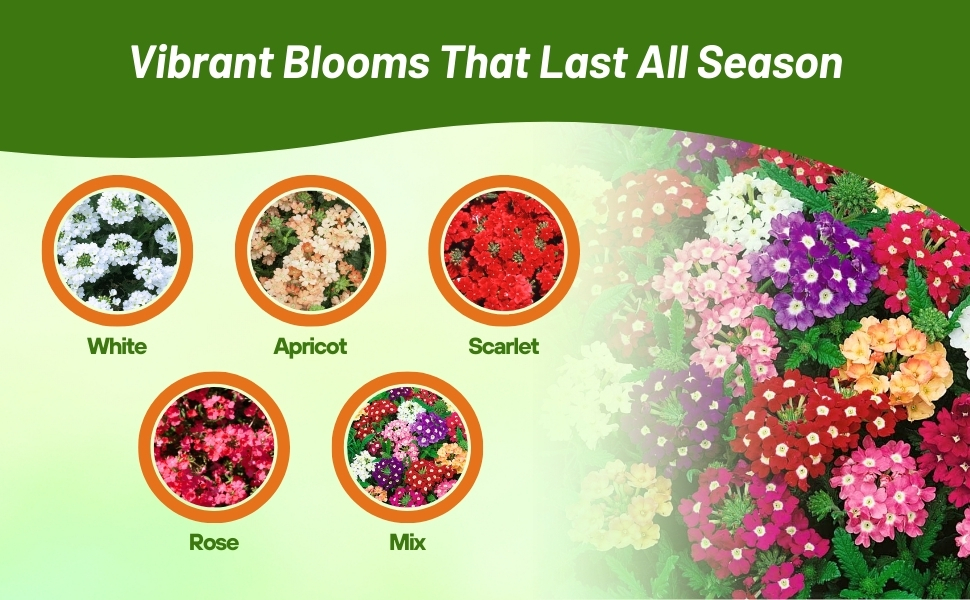
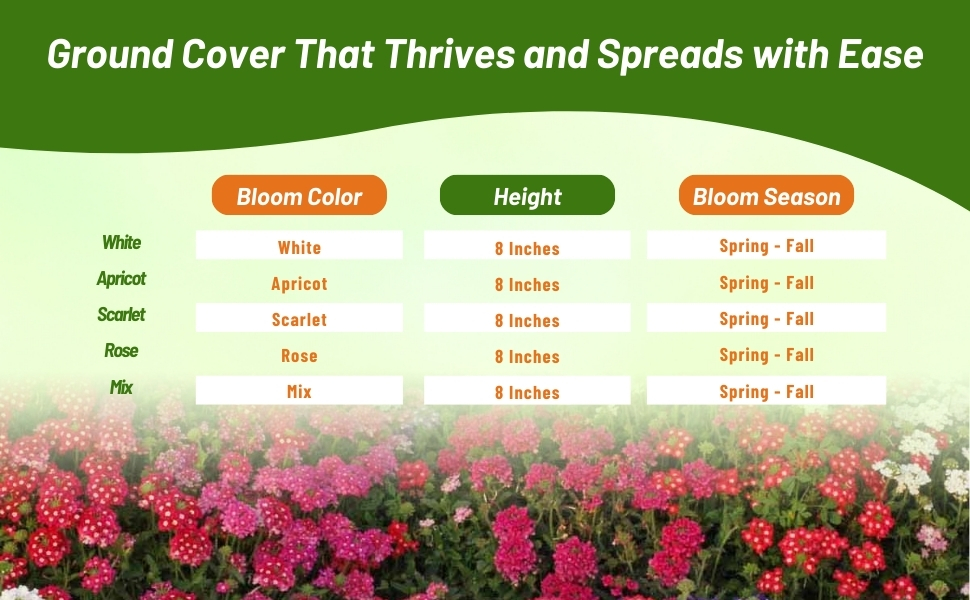
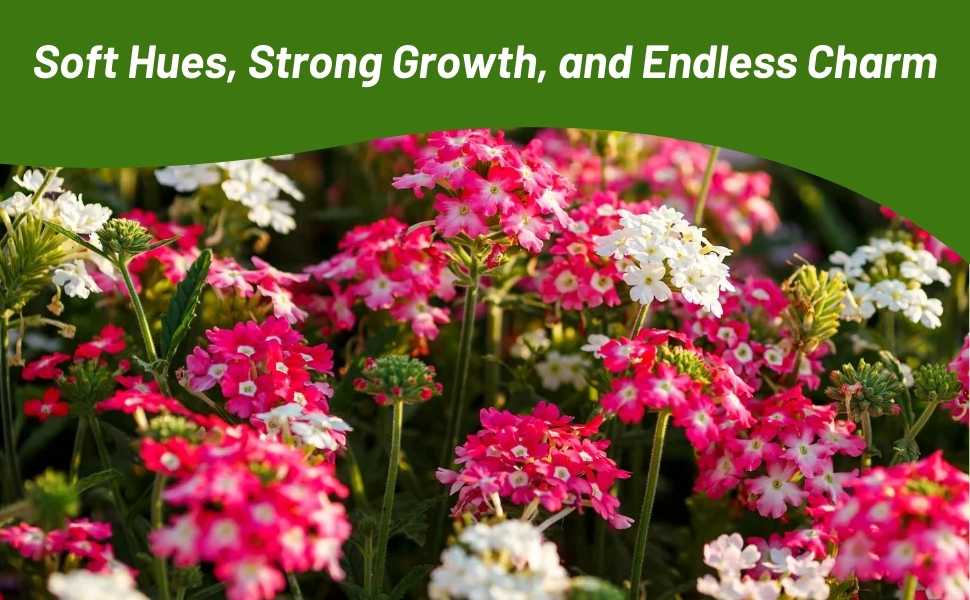
Verbena (Verbena Hybrids Nana Compacta Apricot) - Verbena is one of the garden essentials that bloom from spring to fall with very little fuss. This annual is easy-to-grow from Verbena seeds, and it's such a versatile little plant. Apricot Verbena flowers are particularly gorgeous in hanging baskets and containers, and they are great for edging a border or as general ground cover plants. In frost-free climates it is grown as a perennial, but most of us will grow it as an annual. These low growing ground cover plants grow in clumps that reach a height of approximately 8 inches.
Verbena plants like full sun, moderate water, and good drainage. Without good drainage they are prone to mildew. Verbena care includes trimming the plants back 1 - 2 times per season to keep them looking tidy and stimulate new bloom. You only need to fertilize Verbena ground cover plants once a year and this is usually done in the spring. Use a complete, balanced fertilizer that is not too high in nitrogen. Butterflies love apricot Verbena, but thankfully Verbena plants are deer and rabbit resistant.
How To Grow Verbena From Seed: Soak Verbena seeds in tepid water 24 hours prior to sowing. Sow the ground cover seeds in starter trays, using a sterilized peaty mix. Press Verbena seeds into the soil and lightly cover with peat moss. Verbena ground cover seeds need darkness for germination. Cover the starter tray with newspaper or black plastic with air holes cut into it and keep out of direct sun. Transplant Verbena seedlings into the garden 12 - 18 inches apart.
Common Questions
How long do verbena plants live?
When cultivated as perennials, verbenas typically have a short lifespan, often lasting only two to three years. However, if you are growing a species type instead of a hybrid, these plants can self-seed freely, potentially establishing themselves in such a way that they seem to thrive indefinitely.
How is this plant used in landscaping?
Verbenas thrive in sunny conditions and make excellent companion plants for other sun-loving varieties such as coneflowers, coreopsis, lamb's ear, phlox, and petunias. Hybrid annual verbenas are known for their consistent blooming and are often used in pots or as bedding plants in gardens. They can be planted in groups or positioned as front-edging plants, where their sprawling nature is particularly advantageous. Many hybrids exhibit a trailing growth habit, making them ideal for hanging baskets, rock gardens, or gracefully cascading over short retaining walls. Some varieties spread out, effectively covering ground in sunny locations.
My plants are getting leggy, what do I do?
When verbenas become leggy and sparse, it may indicate that the plant is reaching out for more light. Ensure that the plant gets a minimum of six hours of sunlight daily. If sunlight isn't the problem, consider pruning it back significantly and providing nourishment. This combination of pruning and feeding should encourage robust new growth and an abundance of blooms.
How can I encourage more blooms?
Deadhead your spent flowers to encourage a longer bloom season.
Can I grow in containers?
Verbena is often seen in hanging baskets combined with various flowers, serving as excellent "spillers" that cascade over the edges of the container. For container planting, any general-purpose potting mix can be used in well-draining containers of any material. Additionally, if verbena is growing in the ground, you can pot it up for indoor overwintering. Typically grown as annuals, potted verbenas generally do not need repotting and should be discarded at the end of the growing season. Perennial verbenas have a relatively short lifespan of two to three growing seasons and are not ideal as permanent houseplants. However, potted verbenas can be classified as warm-climate perennials, allowing you to bring them indoors to continue growing during winter. If you choose to move them inside, trim them back by one-third before the transition and place them in a spot that receives ample sunlight.
Planting Directions
TEMPERATURE
75F
AVERAGE GERM TIME
7 - 28 days
LIGHT REQUIRED
No
DEPTH
Cover seed lightly with peat moss
SOWING RATE
2 - 3 seeds per plant
MOISTURE
Keep seeds slightly moist to dry
PLANT SPACING
12 - 18 inches
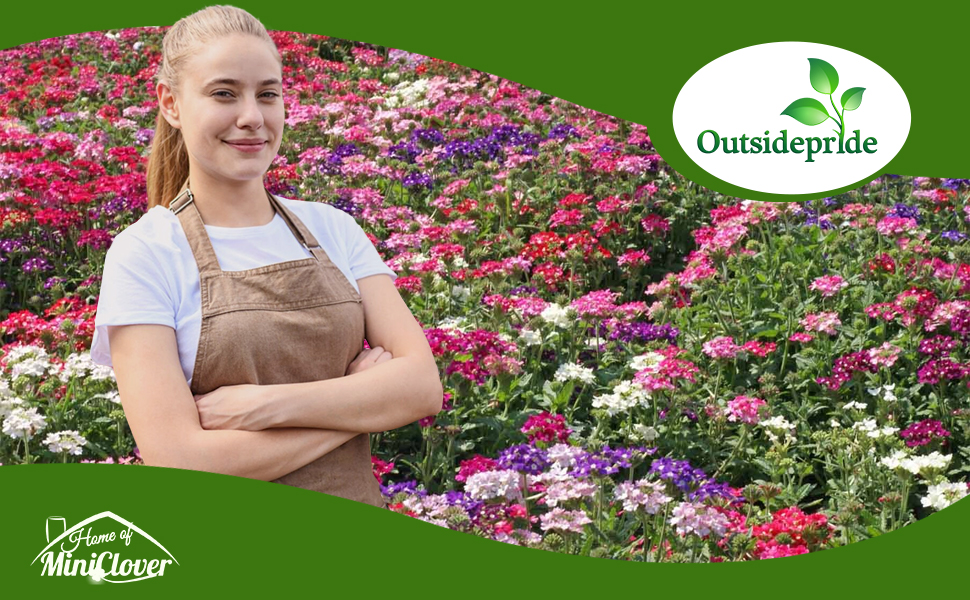
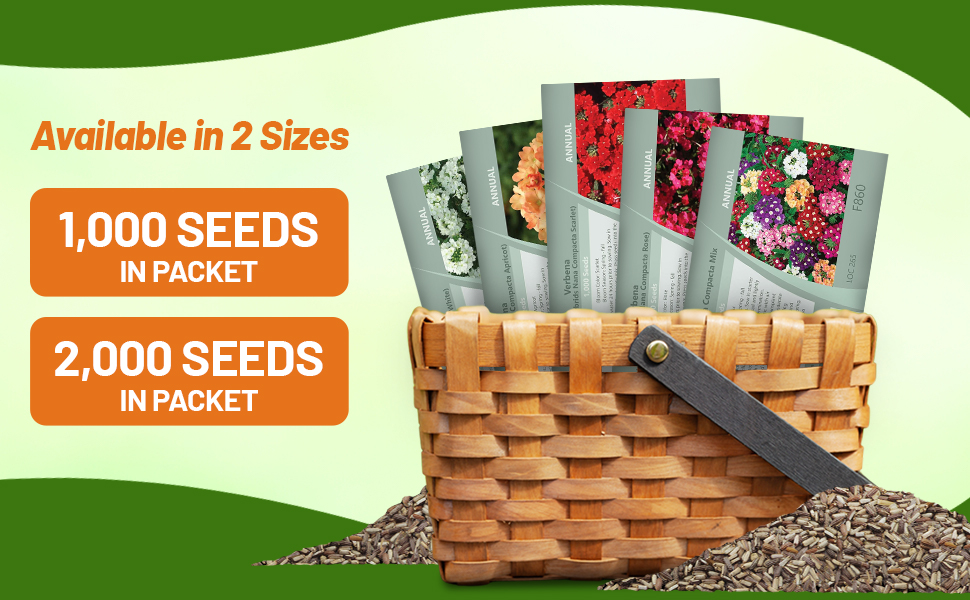
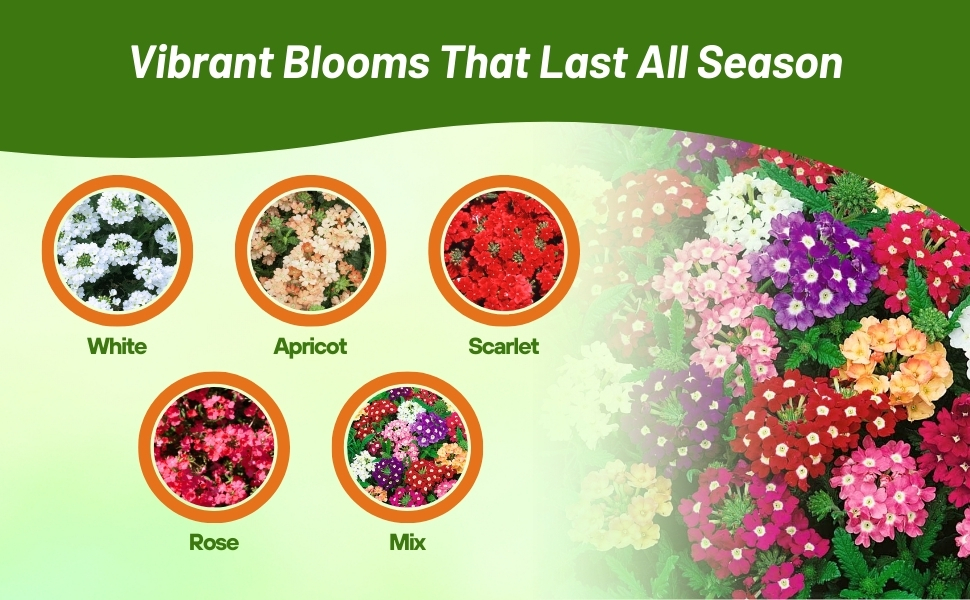
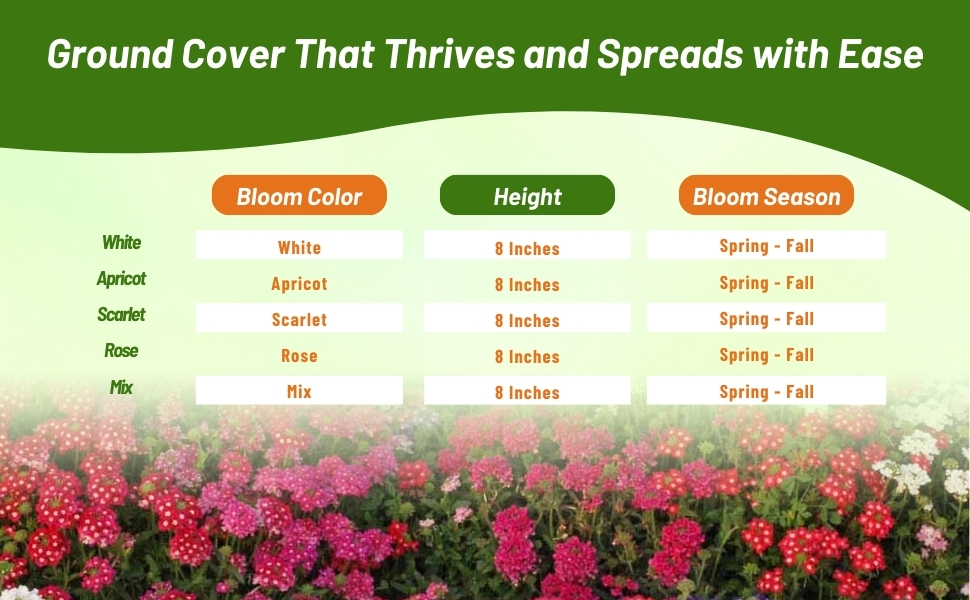
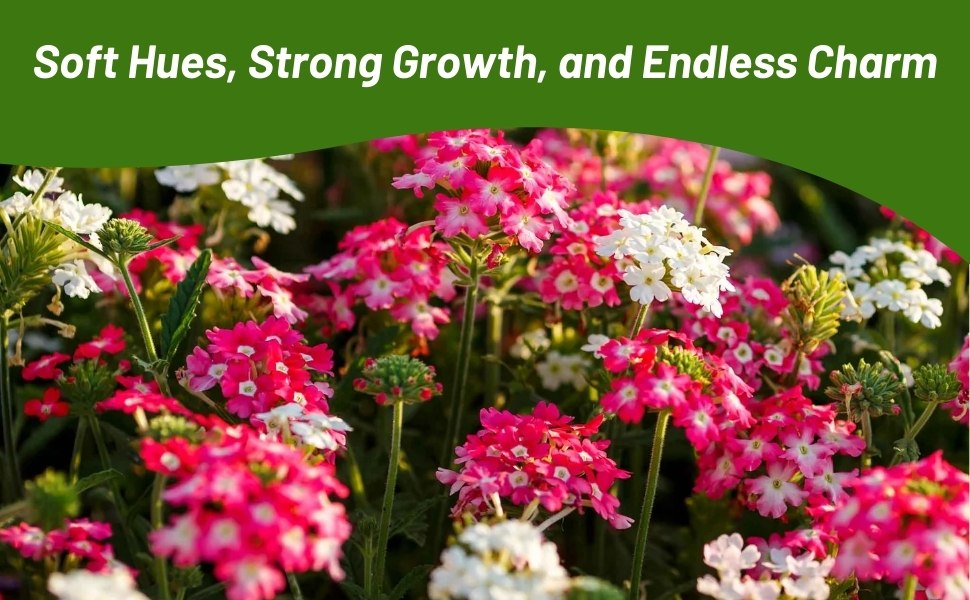
Verbena (Verbena Hybrids Nana Compacta Rose) - Growing Verbena ground cover seeds is so rewarding! This versatile little annual is a must have for the summer landscape. Verbena plants are great for hanging baskets, pots, or window boxes. They also make nice edging plants along the sunny border, or they can create a lovely ground cover for a sunny area. Verbena ground cover plants like full sun, moderate water, and good drainage. Verbena care includes providing a fertilizer for the plants once in the late spring and shearing back the Verbena plants 1 - 2 times per season to keep them tidy and to stimulate new blooms.
Soak Verbena seeds in tepid water 24 hours prior to sowing. Sow Verbena seeds in starter trays, using a sterilized peaty mix. Press the flower seeds into the soil and lightly cover with peat moss. Verbena ground cover seeds need darkness for germination. Cover the starter tray with newspaper or black plastic with air holes cut into it and keep out of direct sun. Transplant Verbena seedlings into the garden 12 - 18 inches apart.
Common Questions
How long do verbena plants live?
When cultivated as perennials, verbenas typically have a short lifespan, often lasting only two to three years. However, if you are growing a species type instead of a hybrid, these plants can self-seed freely, potentially establishing themselves in such a way that they seem to thrive indefinitely.
How is this plant used in landscaping?
Verbenas thrive in sunny conditions and make excellent companion plants for other sun-loving varieties such as coneflowers, coreopsis, lamb's ear, phlox, and petunias. Hybrid annual verbenas are known for their consistent blooming and are often used in pots or as bedding plants in gardens. They can be planted in groups or positioned as front-edging plants, where their sprawling nature is particularly advantageous. Many hybrids exhibit a trailing growth habit, making them ideal for hanging baskets, rock gardens, or gracefully cascading over short retaining walls. Some varieties spread out, effectively covering ground in sunny locations.
My plants are getting leggy, what do I do?
When verbenas become leggy and sparse, it may indicate that the plant is reaching out for more light. Ensure that the plant gets a minimum of six hours of sunlight daily. If sunlight isn't the problem, consider pruning it back significantly and providing nourishment. This combination of pruning and feeding should encourage robust new growth and an abundance of blooms.
How can I encourage more blooms?
Deadhead your spent flowers to encourage a longer bloom season.
Can I grow in containers?
Verbena is often seen in hanging baskets combined with various flowers, serving as excellent "spillers" that cascade over the edges of the container. For container planting, any general-purpose potting mix can be used in well-draining containers of any material. Additionally, if verbena is growing in the ground, you can pot it up for indoor overwintering. Typically grown as annuals, potted verbenas generally do not need repotting and should be discarded at the end of the growing season. Perennial verbenas have a relatively short lifespan of two to three growing seasons and are not ideal as permanent houseplants. However, potted verbenas can be classified as warm-climate perennials, allowing you to bring them indoors to continue growing during winter. If you choose to move them inside, trim them back by one-third before the transition and place them in a spot that receives ample sunlight.
Planting Directions
TEMPERATURE
75F
AVERAGE GERM TIME
7 - 28 days
LIGHT REQUIRED
No
DEPTH
Cover seed lightly with peat moss
SOWING RATE
2 - 3 seeds per plant
MOISTURE
Keep seeds slightly moist to dry
PLANT SPACING
12 - 18 inches
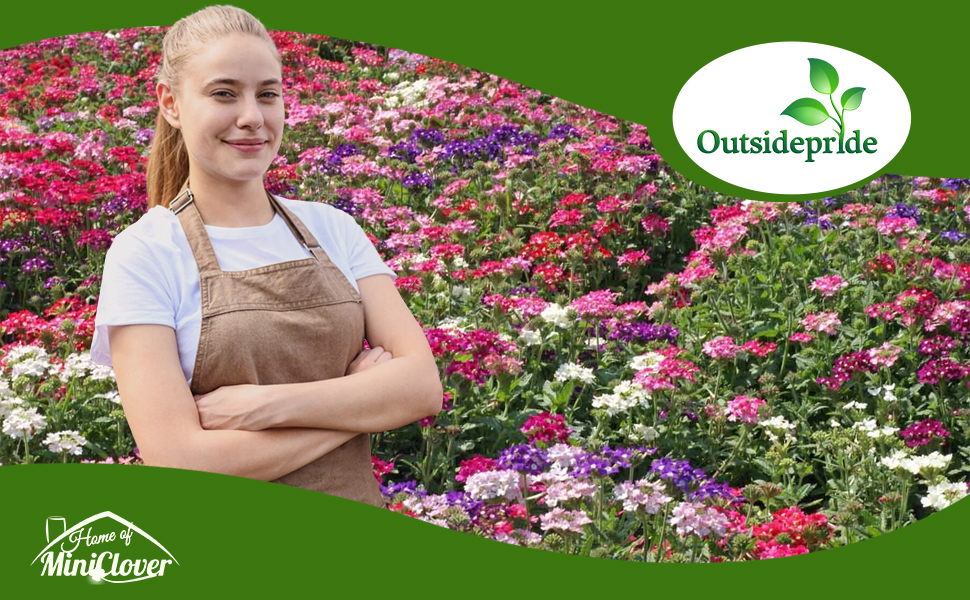
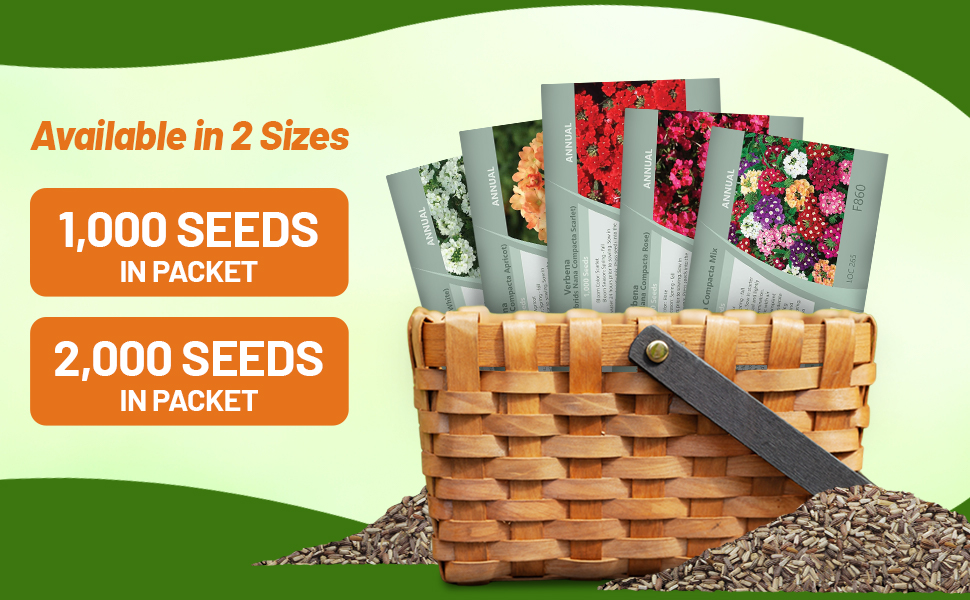
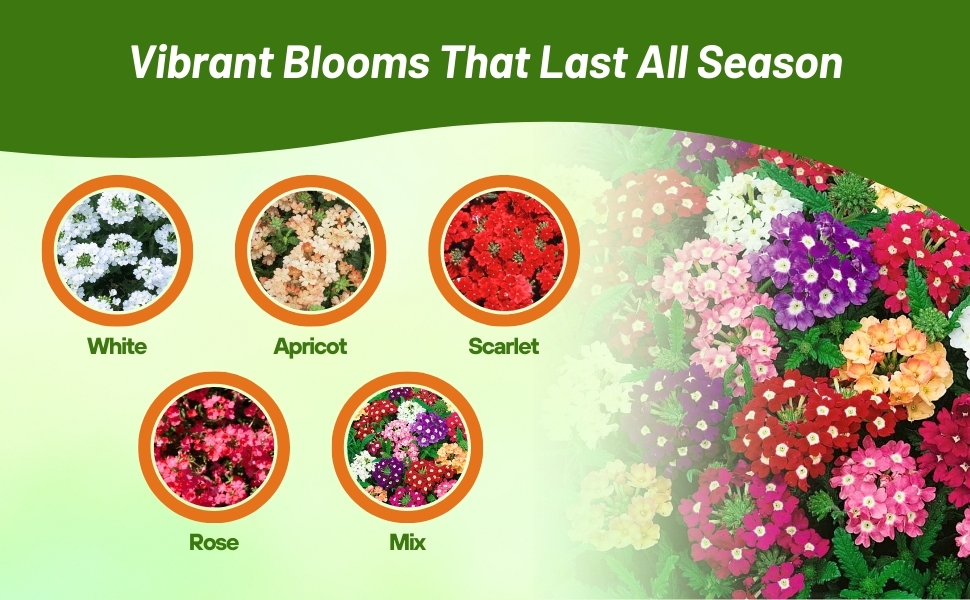
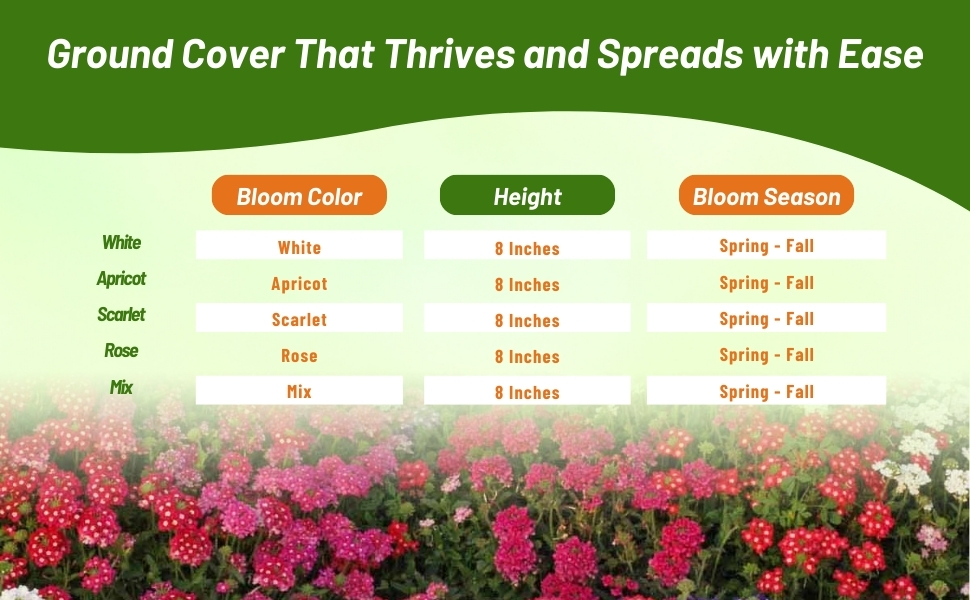
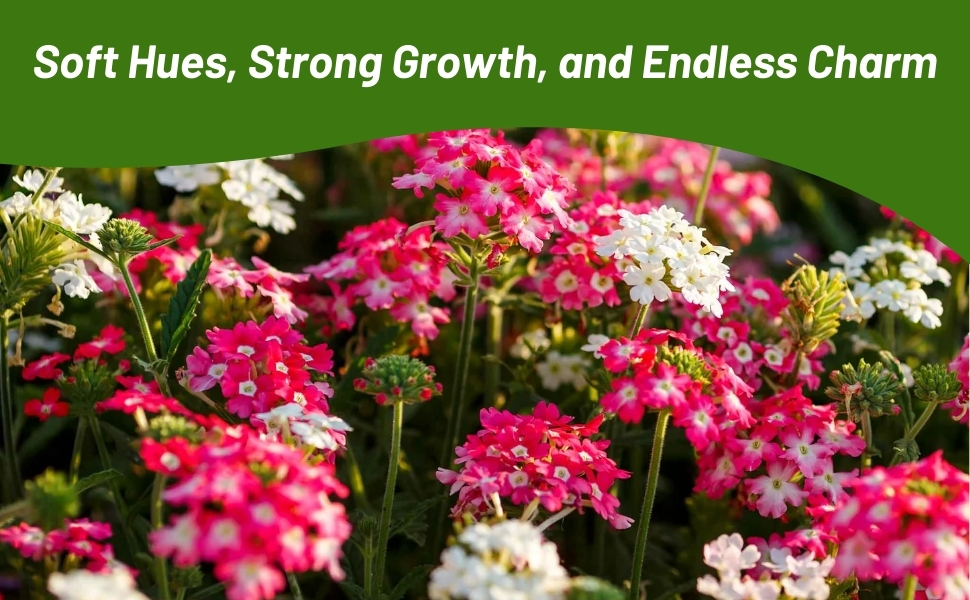
Verbena (Verbena Hybrids Nana Compacta Scarlet) - Do you need a colorful, fast growing ground cover plant for your summer landscape? Look no further than this lovely, low-growing scarlet Verbena. These breathtaking scarlet Verbena flowers are easy to establish from Verbena seeds and they quickly form a dense mat with 2 1/2 - 3 inch bloom clusters that bloom non-stop from late spring until fall.
How To Grow Verbena From Seed: Soak Verbena ground cover seeds in tepid water 24 hours prior to sowing. Sow the seed in starter trays, using a sterilized peaty mix. Press Verbena seeds into the soil and lightly cover with peat moss. Verbena ground cover seeds need darkness for germination. Cover the starter tray with newspaper or black plastic with air holes cut into it and keep out of direct sun. Transplant Verbena seedlings into the garden 12 - 18 inches apart.
Want to do a mass Verbena planting? No problem! You can sow Verbena ground cover seeds directly outdoors in spring when frost season is completely over. Be patient, as these flower seeds can be slow to germinate, but just keep the seed moist with warm temperatures and before long you will have a beautiful ground cover. For the earliest blooms, start the Verbena seeds indoors for transplanting.
Common Questions
How long do verbena plants live?
When cultivated as perennials, verbenas typically have a short lifespan, often lasting only two to three years. However, if you are growing a species type instead of a hybrid, these plants can self-seed freely, potentially establishing themselves in such a way that they seem to thrive indefinitely.
How is this plant used in landscaping?
Verbenas thrive in sunny conditions and make excellent companion plants for other sun-loving varieties such as coneflowers, coreopsis, lamb's ear, phlox, and petunias. Hybrid annual verbenas are known for their consistent blooming and are often used in pots or as bedding plants in gardens. They can be planted in groups or positioned as front-edging plants, where their sprawling nature is particularly advantageous. Many hybrids exhibit a trailing growth habit, making them ideal for hanging baskets, rock gardens, or gracefully cascading over short retaining walls. Some varieties spread out, effectively covering ground in sunny locations.
My plants are getting leggy, what do I do?
When verbenas become leggy and sparse, it may indicate that the plant is reaching out for more light. Ensure that the plant gets a minimum of six hours of sunlight daily. If sunlight isn't the problem, consider pruning it back significantly and providing nourishment. This combination of pruning and feeding should encourage robust new growth and an abundance of blooms.
How can I encourage more blooms?
Deadhead your spent flowers to encourage a longer bloom season.
Can I grow in containers?
Verbena is often seen in hanging baskets combined with various flowers, serving as excellent "spillers" that cascade over the edges of the container. For container planting, any general-purpose potting mix can be used in well-draining containers of any material. Additionally, if verbena is growing in the ground, you can pot it up for indoor overwintering. Typically grown as annuals, potted verbenas generally do not need repotting and should be discarded at the end of the growing season. Perennial verbenas have a relatively short lifespan of two to three growing seasons and are not ideal as permanent houseplants. However, potted verbenas can be classified as warm-climate perennials, allowing you to bring them indoors to continue growing during winter. If you choose to move them inside, trim them back by one-third before the transition and place them in a spot that receives ample sunlight.
Planting Directions
TEMPERATURE
75F
AVERAGE GERM TIME
7 - 28 days
LIGHT REQUIRED
No
DEPTH
Cover seed lightly with peat moss
SOWING RATE
2 - 3 seeds per plant
MOISTURE
Keep seeds slightly moist to dry
PLANT SPACING
12 - 18 inches
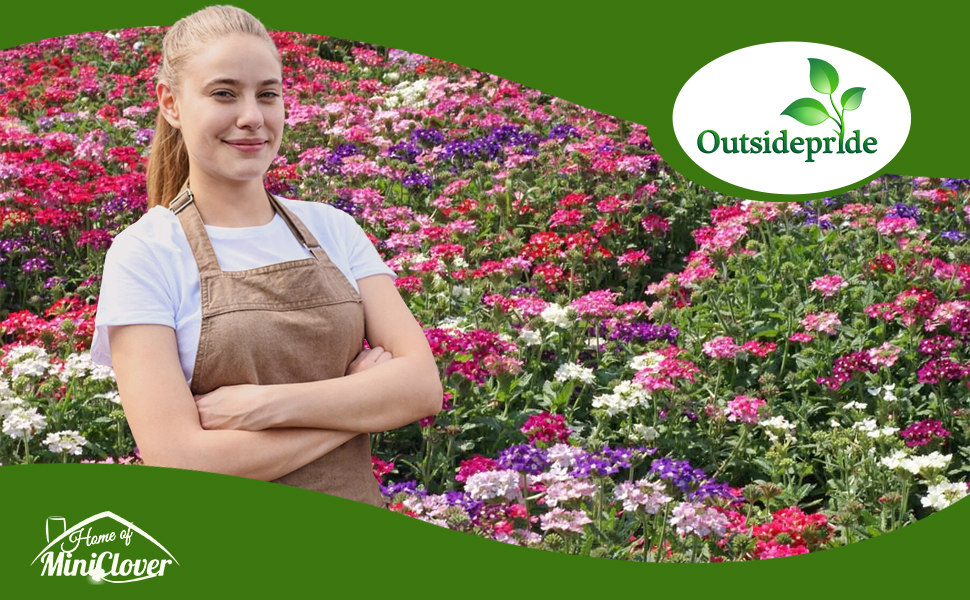
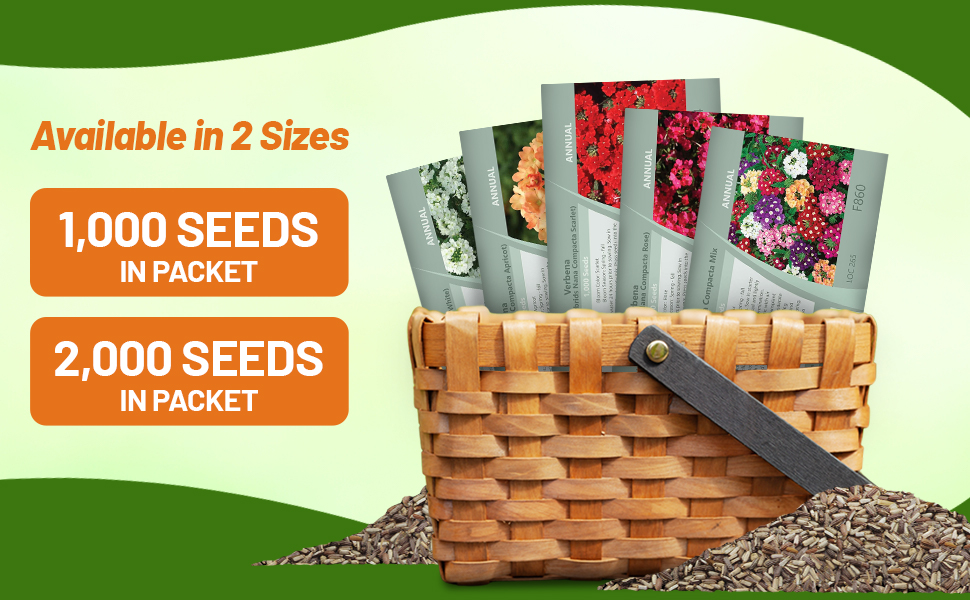
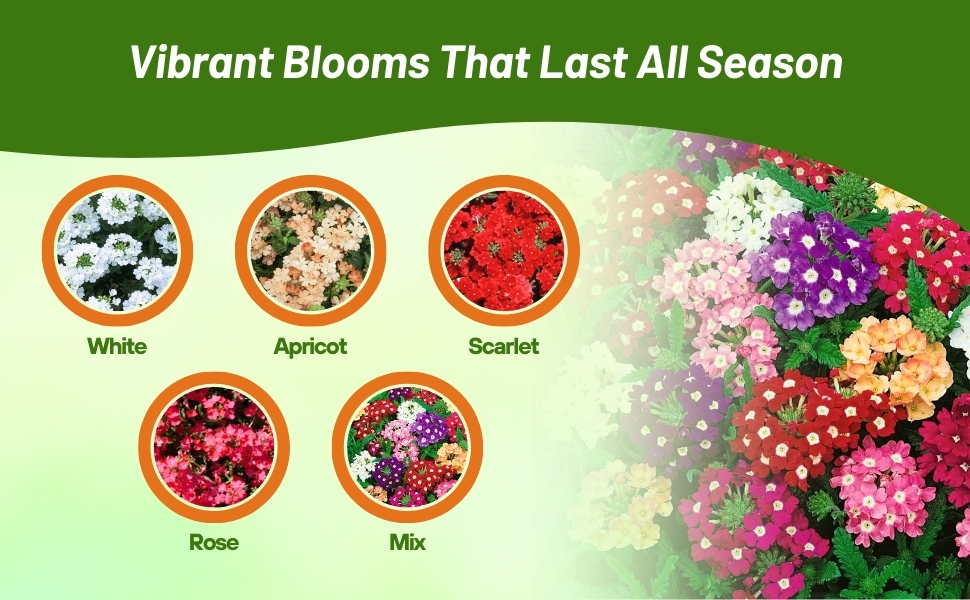
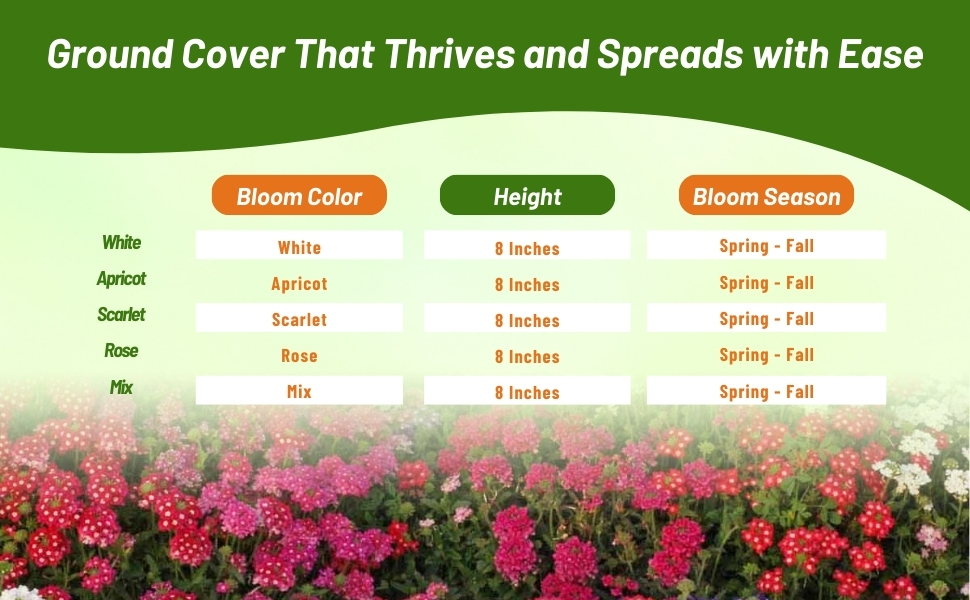
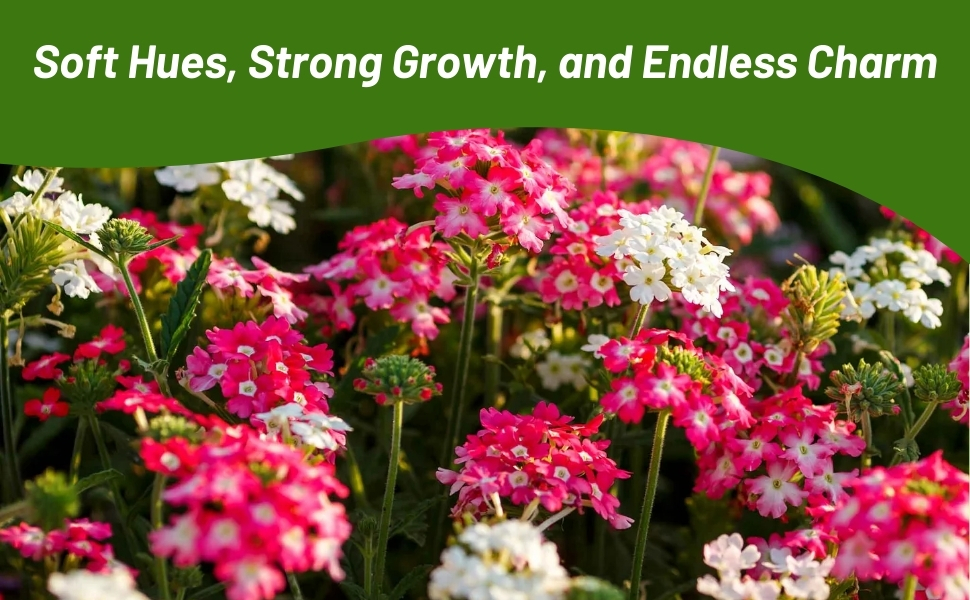
Verbena (Verbena Hybrids Nana Compacta White) - Verbena is a familiar summer annual that adds so much with so little effort! This white Verbena has a dwarf and compact growth habit which makes it ideal for growing as a ground cover plant. White Verbena flowers are perfect for free flowering hanging baskets, flowing out over the edge of pots or window sill boxes. Or use them as edging plants in the sunny border. These little white Verbena plants are so versatile! And, they bloom from late spring until fall and the first frost! Verbena care includes trimming the plant back a time or two during the season to neaten its appearance and to promote more blooming.
Soak Verbena seeds in tepid water 24 hours prior to sowing. Sow the seed in starter trays, using a sterilized peaty mix. Press white Verbena flower seeds into the soil and lightly cover with peat moss. Verbena ground cover seeds need darkness for germination. Cover the starter tray with newspaper or black plastic with air holes cut into it and keep out of direct sun. Transplant Verbena seedlings into the garden 12 - 18 inches apart.
Want to do a mass Verbena planting? No problem! You can sow Verbena ground cover seeds directly outdoors in spring when frost season is completely over. Be patient, as these flower seeds can be slow to germinate, but just keep the seed moist with warm temperatures and before long you will have a beautiful ground cover. For the earliest blooms, start the Verbena seeds indoors for transplanting.
Common Questions
How long do verbena plants live?
When cultivated as perennials, verbenas typically have a short lifespan, often lasting only two to three years. However, if you are growing a species type instead of a hybrid, these plants can self-seed freely, potentially establishing themselves in such a way that they seem to thrive indefinitely.
How is this plant used in landscaping?
Verbenas thrive in sunny conditions and make excellent companion plants for other sun-loving varieties such as coneflowers, coreopsis, lamb's ear, phlox, and petunias. Hybrid annual verbenas are known for their consistent blooming and are often used in pots or as bedding plants in gardens. They can be planted in groups or positioned as front-edging plants, where their sprawling nature is particularly advantageous. Many hybrids exhibit a trailing growth habit, making them ideal for hanging baskets, rock gardens, or gracefully cascading over short retaining walls. Some varieties spread out, effectively covering ground in sunny locations.
My plants are getting leggy, what do I do?
When verbenas become leggy and sparse, it may indicate that the plant is reaching out for more light. Ensure that the plant gets a minimum of six hours of sunlight daily. If sunlight isn't the problem, consider pruning it back significantly and providing nourishment. This combination of pruning and feeding should encourage robust new growth and an abundance of blooms.
How can I encourage more blooms?
Deadhead your spent flowers to encourage a longer bloom season.
Can I grow in containers?
Verbena is often seen in hanging baskets combined with various flowers, serving as excellent "spillers" that cascade over the edges of the container. For container planting, any general-purpose potting mix can be used in well-draining containers of any material. Additionally, if verbena is growing in the ground, you can pot it up for indoor overwintering. Typically grown as annuals, potted verbenas generally do not need repotting and should be discarded at the end of the growing season. Perennial verbenas have a relatively short lifespan of two to three growing seasons and are not ideal as permanent houseplants. However, potted verbenas can be classified as warm-climate perennials, allowing you to bring them indoors to continue growing during winter. If you choose to move them inside, trim them back by one-third before the transition and place them in a spot that receives ample sunlight.
Planting Directions
TEMPERATURE
65F
AVERAGE GERM TIME
10 - 25 days
LIGHT REQUIRED
No
DEPTH
Surface sow no more than 1/8 inch
SOWING RATE
1 ounce per 1,500 square feet
MOISTURE
Keep seeds moist until germination
PLANT SPACING
24 inches
CARE & MAINTENANCE
Verbena...less

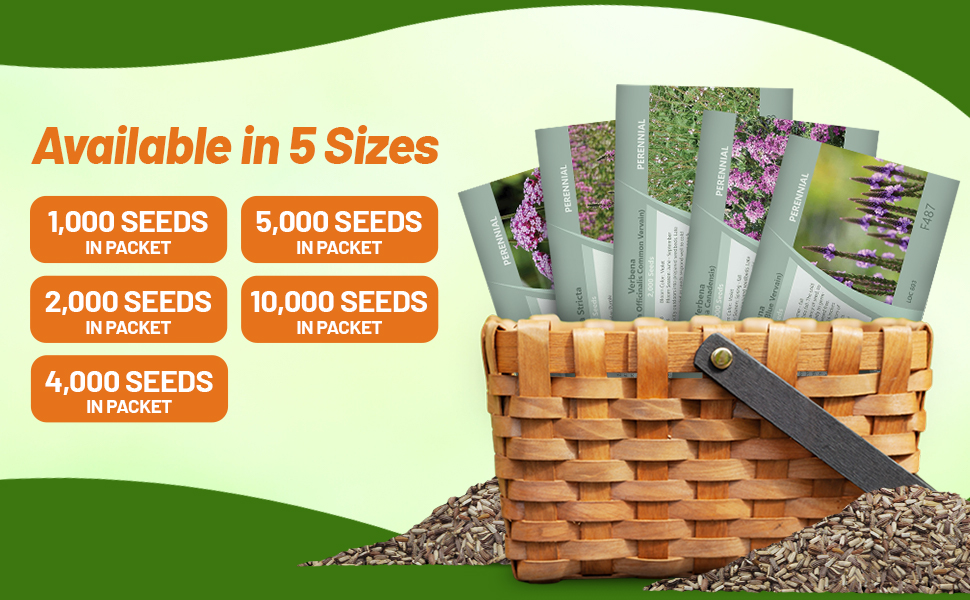
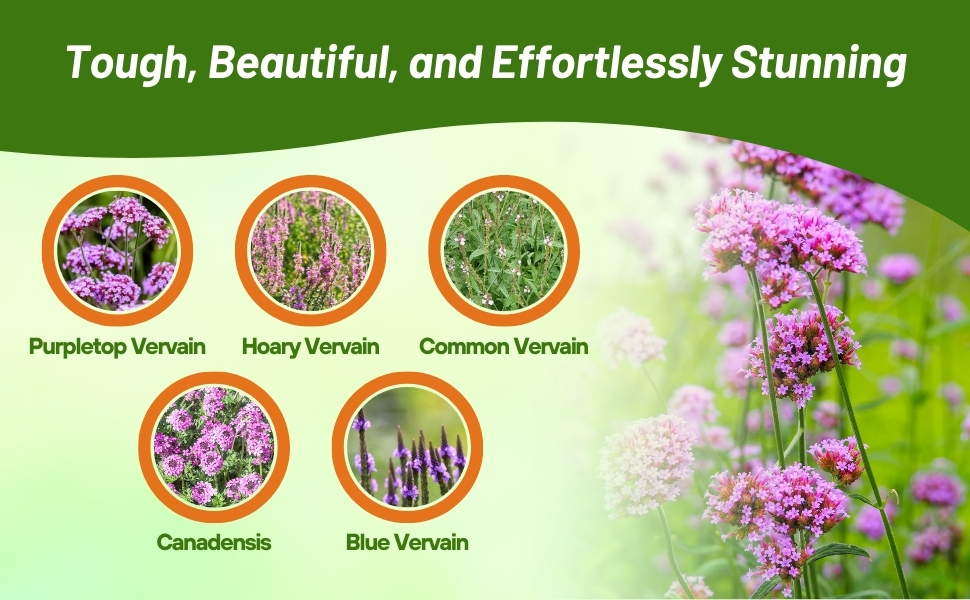
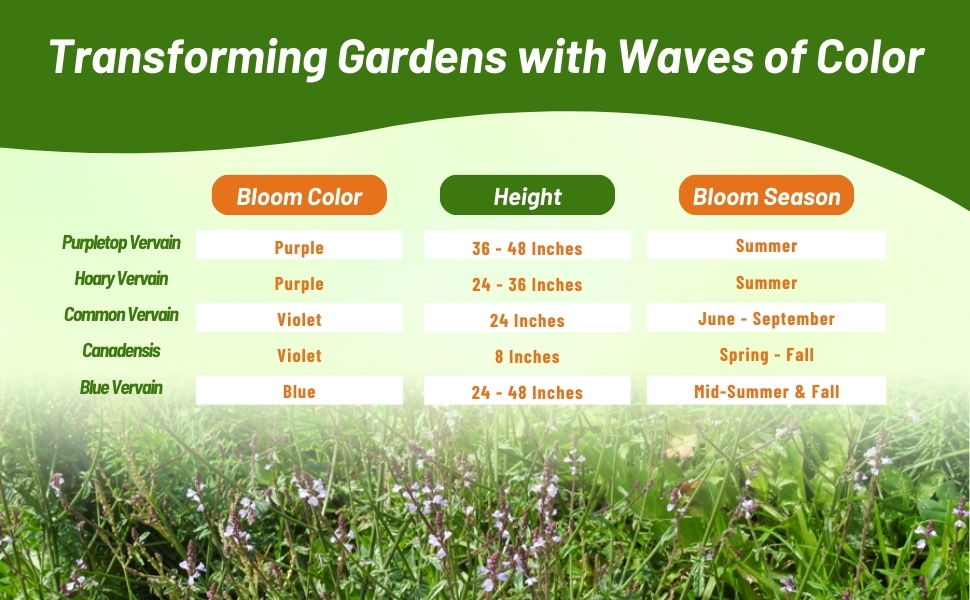
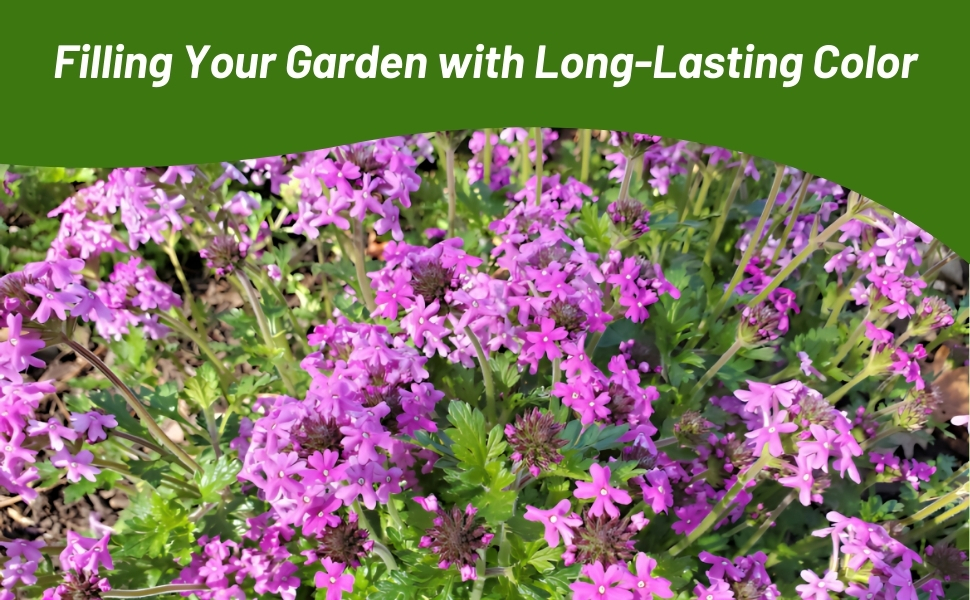
Verbena (Verbena Hastata Blue Vervain) - Start Verbena seeds and grow this flowering drought tolerant plant with numerous, pencil-like flower spikes that branch upwards like the arms of a candelabra. Commonly called Blue Vervain, some say the plant resembles a candelabra with blue flames! Each flower spike has a band of blue-purple flowers that begin opening at the bottom of the spike first, and then gradually open all the way to the top of the spike.
Bumblebees are among the important pollinators of this important Verbena Blue Vervain. The tall thin spikes of Blue Vervain plants grace the wet meadows of the United States in late summer. Verbena Hastata flowers are short-lived perennials that readily self-sow, and they can be found in wet meadows, wet river bottom lands, stream banks, slough peripheries, fields and waste areas.
Growing Blue Vervain seed is greatly rewarding! It is recommended to sow Verbena Hastata seeds directly outdoors in the late fall. The cold temperatures actually help to break the dormancy of the flower seed, so when spring temperatures warm, the Verbena seeds are ready to germinate. Broadcast the Verbena seeds in prepared soil that is weed free. Lightly rake the seed under the soil. Thin the Blue Vervain seedlings to 24 inches apart.
Approximately 100,000 seeds per ounce.
Common Questions
How long do verbena plants live?
When cultivated as perennials, verbenas typically have a short lifespan, often lasting only two to three years. However, if you are growing a species type instead of a hybrid, these plants can self-seed freely, potentially establishing themselves in such a way that they seem to thrive indefinitely.
How is this plant used in landscaping?
Verbenas thrive in sunny conditions and make excellent companion plants for other sun-loving varieties such as coneflowers, coreopsis, lamb's ear, phlox, and petunias. Hybrid annual verbenas are known for their consistent blooming and are often used in pots or as bedding plants in gardens. They can be planted in groups or positioned as front-edging plants, where their sprawling nature is particularly advantageous. Many hybrids exhibit a trailing growth habit, making them ideal for hanging baskets, rock gardens, or gracefully cascading over short retaining walls. Some varieties spread out, effectively covering ground in sunny locations.
My plants are getting leggy, what do I do?
When verbenas become leggy and sparse, it may indicate that the plant is reaching out for more light. Ensure that the plant gets a minimum of six hours of sunlight daily. If sunlight isn't the problem, consider pruning it back significantly and providing nourishment. This combination of pruning and feeding should encourage robust new growth and an abundance of blooms.
How can I encourage more blooms?
Deadhead your spent flowers to encourage a longer bloom season.
Can I grow in containers?
Verbena is often seen in hanging baskets combined with various flowers, serving as excellent "spillers" that cascade over the edges of the container. For container planting, any general-purpose potting mix can be used in well-draining containers of any material. Additionally, if verbena is growing in the ground, you can pot it up for indoor overwintering. Typically grown as annuals, potted verbenas generally do not need repotting and should be discarded at the end of the growing season. Perennial verbenas have a relatively short lifespan of two to three growing seasons and are not ideal as permanent houseplants. However, potted verbenas can be classified as warm-climate perennials, allowing you to bring them indoors to continue growing during winter. If you choose to move them inside, trim them back by one-third before the transition and place them in a spot that receives ample sunlight.
Planting Directions
TEMPERATURE
70F
AVERAGE GERM TIME
10 - 25 days
LIGHT REQUIRED
No
DEPTH
Surface sow no more than 1/8 inch
SOWING RATE
1 ounce per 600 square feet
MOISTURE
Keep seeds moist until germination
PLANT SPACING
12 - 24 inches
CARE & MAINTENANCE
Verbena...less

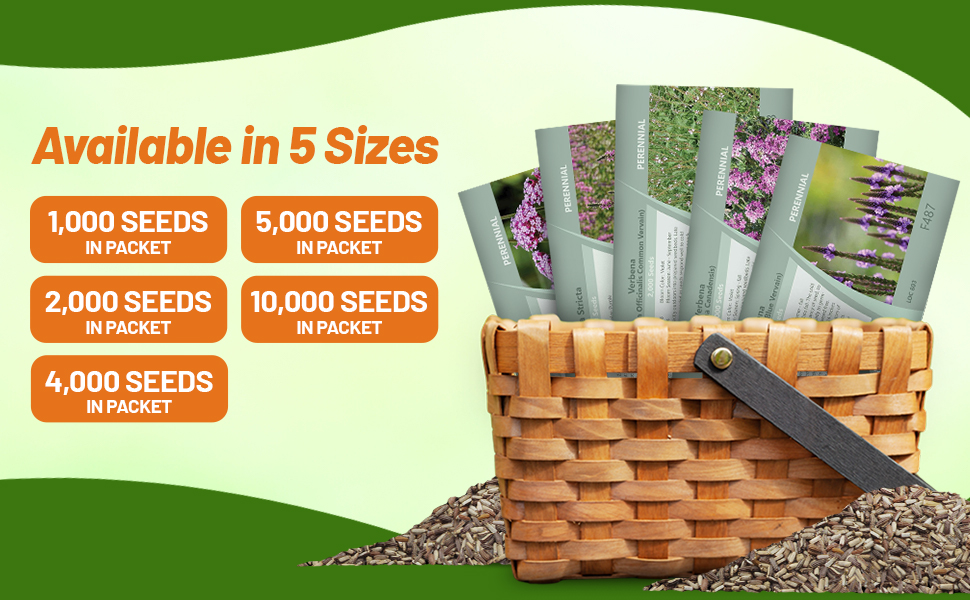
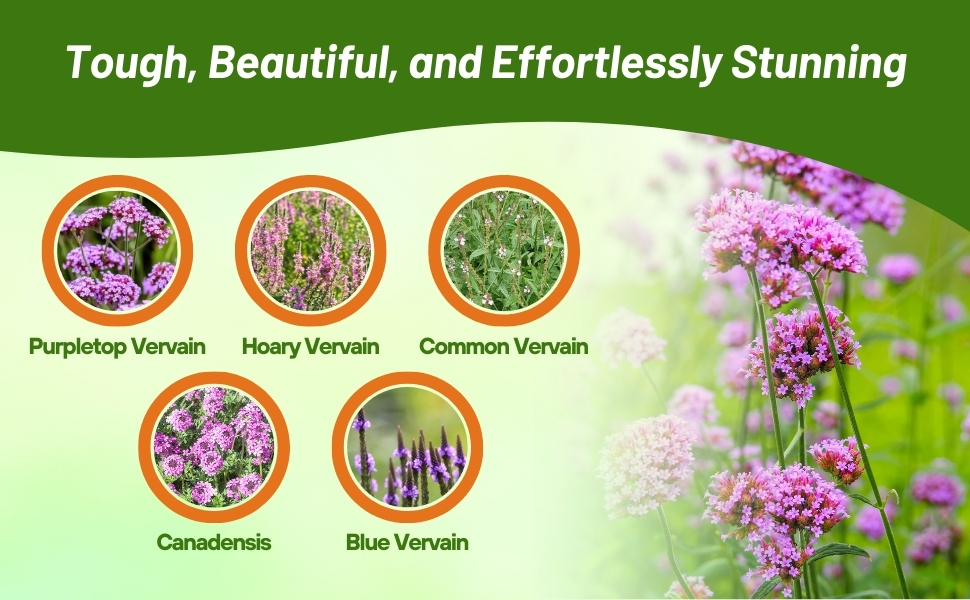
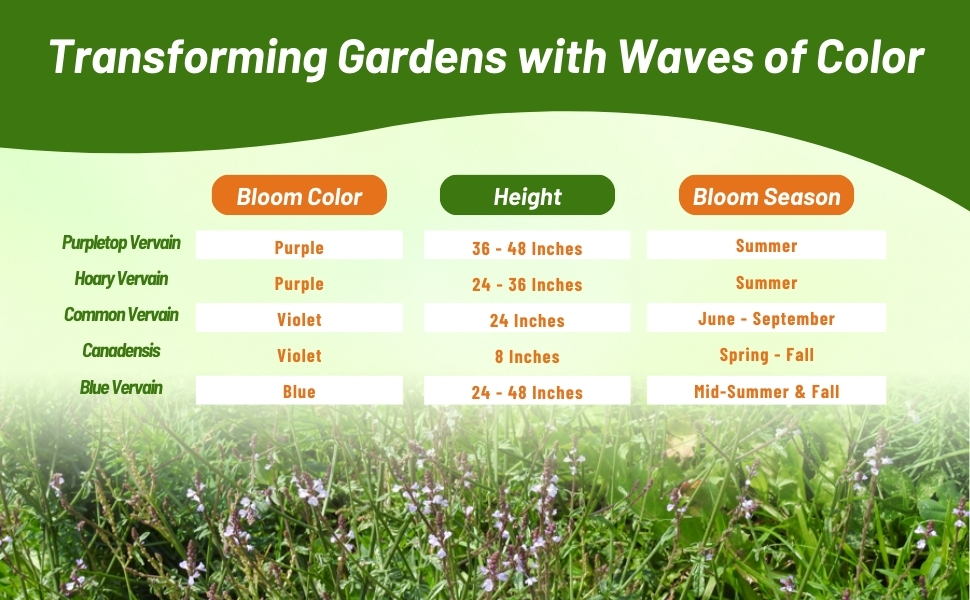
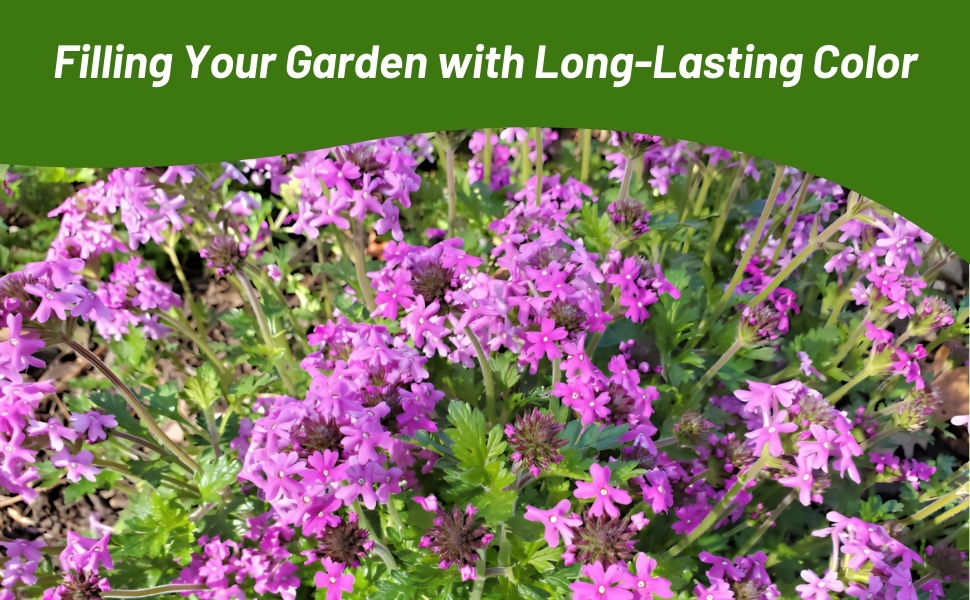
Verbena (Verbena Stricta) - Known as Hoary Vervain, this is another perennial that is grown from Verbena seeds. Hoary Vervain grows in narrow upright clumps 24 - 36 inches tall with showy flowers that are densely packed on narrow pencil-like spikes. The Hoary Vervain flowers bloom from the bottom of the spike up and are a violet blue color. The stems and leaves are heavily covered with long white hairs giving the foliage a whitish-green appearance. The leaves are up to 4 inches long and 2 1/2 inches across. Hoary Verbena makes an excellent cut flower, and butterflies use the foliage for their larva.
The Hoary Vervain plant grows best in full sun and average to dry conditions. It will flourish in poor soil consisting of clay, sand, or gravel. It will also grow well in rich loamy soil, but will often be out-competed by other plants. Drought resistance is good, although some of the lower leaves may shrivel and fall off the plant if enough water is not received.
Verbena seeds can be sown directly outdoors into prepared seedbeds. Late fall sowing is recommended as the Hoary Vervain flower seeds respond well to cold temperatures. If Hoary Vervain seeds are planted in the spring, a cold treatment needs to be done before planting. Dampen a paper towel, spread the flower seeds on the towel and carefully roll the towel up. Place the damp towel with the seeds in a ziploc bag and seal it. Place the bag with Verbena seeds into the refrigerator for 4 weeks. After the cold treatment, Hoary Vervain seed can be started in the spring or even indoors.
Approximately 33,000 seeds per ounce.
Common Questions
How long do verbena plants live?
When cultivated as perennials, verbenas typically have a short lifespan, often lasting only two to three years. However, if you are growing a species type instead of a hybrid, these plants can self-seed freely, potentially establishing themselves in such a way that they seem to thrive indefinitely.
How is this plant used in landscaping?
Verbenas thrive in sunny conditions and make excellent companion plants for other sun-loving varieties such as coneflowers, coreopsis, lamb's ear, phlox, and petunias. Hybrid annual verbenas are known for their consistent blooming and are often used in pots or as bedding plants in gardens. They can be planted in groups or positioned as front-edging plants, where their sprawling nature is particularly advantageous. Many hybrids exhibit a trailing growth habit, making them ideal for hanging baskets, rock gardens, or gracefully cascading over short retaining walls. Some varieties spread out, effectively covering ground in sunny locations.
My plants are getting leggy, what do I do?
When verbenas become leggy and sparse, it may indicate that the plant is reaching out for more light. Ensure that the plant gets a minimum of six hours of sunlight daily. If sunlight isn't the problem, consider pruning it back significantly and providing nourishment. This combination of pruning and feeding should encourage robust new growth and an abundance of blooms.
How can I encourage more blooms?
Deadhead your spent flowers to encourage a longer bloom season.
Can I grow in containers?
Verbena is often seen in hanging baskets combined with various flowers, serving as excellent "spillers" that cascade over the edges of the container. For container planting, any general-purpose potting mix can be used in well-draining containers of any material. Additionally, if verbena is growing in the ground, you can pot it up for indoor overwintering. Typically grown as annuals, potted verbenas generally do not need repotting and should be discarded at the end of the growing season. Perennial verbenas have a relatively short lifespan of two to three growing seasons and are not ideal as permanent houseplants. However, potted verbenas can be classified as warm-climate perennials, allowing you to bring them indoors to continue growing during winter. If you choose to move them inside, trim them back by one-third before the transition and place them in a spot that receives ample sunlight.































